















It is rather pleasing to lead with a positive story Given all the woes with inflation staffing issues energy crisis, and the long term issues which have dogged adult social care such as funding being able to lead the positive story is definitely satisfy ing
It is a story very close to my heart Regular read ers (and I do hope you are out there) will know that I have often commented on Alzheimer’s since my mother suffered with a very aggressive form of the disease in the 1980s and died in the early 90s
I had never heard of the disease in 1985 A visit to our family GP resulted in us being reassured that it was part and parcel of growing old bear in mind my mother was younger then than I am now!
This is not a criticism of our family doctor She was a long standing and respect ed GP, but I suspect, like many doctors at the time, she too knew very little of the condition Alzheimer s disease
It was for my whole family a devastating time My mother was strongly inde pendent, and bit by bit the disease, as everybody knows, takes away strength inde pendence and, unfortunately, dignity
While this story is still developing and research is still in the early stages with I am sure a very long way to go it is most welcome news
I would also draw your attention to another story on page 7, where the House of Lords Adult Social Care Committee say that the government s recent Autumn state ment “leaves many questions unanswered”
Rather an understatement one would think, and Baroness Andrews makes the point we made here last week when we received submissions from sector leaders and observers that the funds set aside for social care over the next three years fall far short of the funds the current Chancellor Jeremy Hunt recommended as chair of the health and social care committee
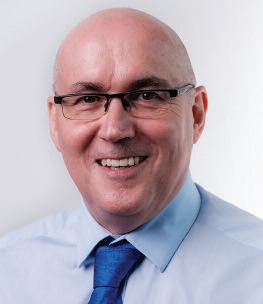
While Mr Hunt did express regret that social care reforms were being pushed back a further two years he is of course not the first to do so Successive Conservative prime ministers from David Cameron onwards have kicked introduc ing versions of the social care cap into the long grass , as Martin Green has said

In many ways I feel the two stories share a connection ambiguous though that may be Dementia is costing the UK economy £25 billion each year and is climbing A staggering amount and lecanemab which indications are will slow down the rate of cognitive decline and will allow a further 19 months of independence will save the country billions of pounds

Hopefully this will then release funds to support adult social care generally!
And soon we will be returning to the festive season so once again we urge you to send in stories of your festive celebrations (see page 5) for our Christmas hamper competition!
And please do continue to share your stories of awards, birthday celebrations, fundraising sports events singing and dancing All feelgood stories which highlight the dedication commitment and devotion staff display in every day improving the well being of the residents!
I can always be contacted at editor@thecareruk com
The results show the drug was able to slow the rate of decline in people s memory and thinking as well as function over 18 months and also helped people with day to day activities
The trial known as Clarity AD included 1 795 people with early stage Alzheimer’s and mild cognitive impairment (MCI) due to Alzheimer’s, who received a bi weekly infusion of either lecanemab or a dummy drug (placebo)
The drug given as an injection was designed to clear a build up of amyloid toxic plaques in the brain that are thought to cause the devas tating condition
Experts today said that while the drug could be available to UK patients as early as 2023 concerns have been raised that just one in 20 patients will benefit from the treatment because the NHS dementia service is severely under resourced
Professor Hardy a dementia researcher and molecular biologist at University College London has called for middle aged Britons to be regularly screened for Alzheimer's, similar to current cervical cancer checks for women to spot those who could benefit from treatment Almost 1million Britons and 7million Americans have dementia, with up to three quarters of cases thought to be caused by Alzheimer's disease Alzheimer’s Research UK puts the cost of car ing for people with dementia at more than £25bn a year
MAJOR STEP FORWARD
Dr Susan Kohlhaas Director of Research at Alzheimer’s Research UK said: These exciting findings represent a major step forward for dementia research and could her ald a new era for people with Alzheimer’s disease This is the first time a drug has been shown to both reduce the disease in the
Lecanemab works by clearing the amyloid protein that builds up in the brain in people with Alzheimer’s disease In this trial, the drug slowed down participants decline in memory and thinking and their ability to carry out day to day activities Although the benefits were small and came with significant side effects, it marks the arrival of a treatment that can slow the course of Alzheimer s disease “QUESTIONS AND CHALLENGES” REMAIN
“With all this excitement there are still many questions and chal lenges we need to address

The treatment window in the trial was for 18 months so we don t yet know whether there will be impacts to people that last beyond this Longer term studies that are ongoing will tell us whether the modest improvements seen in the trial change the trajectory of the disease longer term
Lecanemab was associated with severe side effects and it will be important for regulators to understand the safety profile of the drug before it is given a full license for use
The benefits of taking lecanemab in the trial were modest but the challenge and opportunity remains within dementia research to build on these findings into an era where we’re developing multiple treat ments against different aspects of Alzheimer s disease to slow and stop the disease
“It’s safe to say that the NHS is not ready for a new era of dementia treatment
“We estimate that unless there are drastic changes in how people access specialist diagnostic tests for Alzheimer s disease only 2% of people eligible for drugs like lecanemab will be able to access them We recommend, through the new Dementia Mission, the government take urgent steps to bring together regulators industry clinicians and decision makers in our health system to put a clear plan in place to ensure people in the UK are among the first in the world to access new treatments once they are licensed
“This is truly a historic moment for dementia research This year is the 30th anniversary of the seminal work that revealed the central role of amyloid protein in Alzheimer s The road to an anti amyloid treat
ment has been a long one and people with Alzheimer s have seen many disappointing setbacks We hope that this drug will make it to patients, but it won’t be suitable for everyone with Alzheimer’s, and it’s only a first step on the journey towards a cure
Dr Elizabeth Coulthard who treats patients at North Bristol NHS Trust, says that people have, on average six years of living independ ently once mild cognitive impairment starts

Slow that decline by a quarter and it could equate to an extra 19 months of independent life "but we don't know that yet" she says
The emergence of drugs that do alter the course of the disease asks big questions of whether the health service is ready to use them
The drugs must be administered early in the disease before too much damage to the brain is done whereas most people referred to memory services are often in the later stages of the disease
That requires people coming forward at the initial signs of memory difficulties and doctors being able to send them for amyloid tests either brain scans or spinal fluid analysis, to a establish if they have Alzheimer s or another form of dementia Presently just 1 2% of people with dementia have such tests
"There's an enormous gulf between current service provision and what we need to do to deliver disease modifying therapies said Dr Coulthard
She said that currently only those living near big medical centres or paying privately were likely to benefit TOOK PART IN TRIAL
David Essam, who is 78 and from Kent in the UK, took part in the international trial
His Alzheimer s meant he had to give up work as a joiner he could no longer remember how to build a cabinet or use his tools He now uses a digital watch as he can t tell time using a clock face
He s not the man he was he needs help with most things his mem ory in general is almost non existent," said his wife Cheryl But she said the trial had given the family hope
David said: If somebody can slow it [Alzheimer s] down and eventu ally stop it all together that would be brilliant, it's just a horrible nasty thing
A specialist dementia nurse in Cheshire is encouraging families caring for a loved one with dementia to use Christmas as a chance to reminisce
Admiral Nurse Laura Birch who works at Dementia Resource Community in partnership with Dementia UK the specialist nurse charity says the festive period is the perfect chance to create opportunities for people with dementia to help trigger Christmas memories
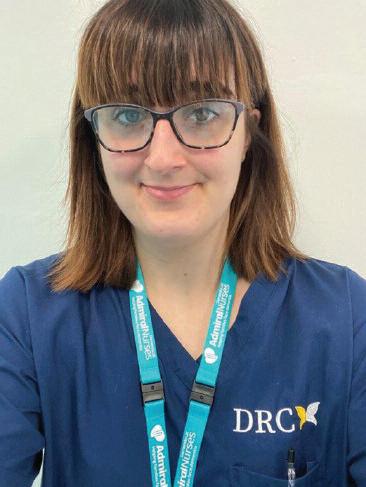
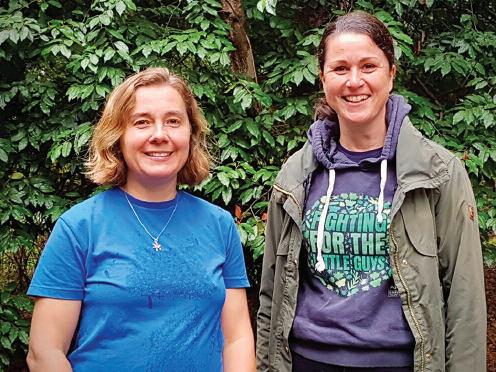
Laura 26 who covers the Macclesfield Wilmslow and Knutsford areas of Cheshire, works alongside the Adults Memory Team at the Jocelyn Solly Resource Centre in Macclesfield
She said “It is important to be surrounded by loved ones during the festivities but awareness of symptoms associated with demen tia is key to ensuring a comfortable and relaxing Christmas for all
“An overstimulating environment can be hard for people with dementia and may cause anxiety especially if they have difficulty with communication, visual or hearing issues
It is important to consider what can be done to reduce anxieties and help those living with memory prob lems feel comfortable
“Reminiscence therapy is a popular psychosocial intervention that can be used to reduce agitation, anxi ety and help develop bonds between those living with the condition and their care givers
For those with dementia, long term memories can remain longer than short term memories and they often return to previous occasions including their past Christmas memories
“At this time of year I like to encourage families to introduce reminiscence activities to reduce anxiety and promote good tidings
There are a lot of things you can do such as making a memory album packed with thought provoking photographs from a person’s past
I also like memory boxes filled with old photographs and other sensory provoking items This could include their favourite smells, such as aftershaves, candles they used to have in their home, or other familiar smells that may provoke stimulating conversation
“Music is also important and playing Christmas songs and carols can help to bring back all sorts of memo ries
I m passionate about dementia care Providing education advice and coping strategies to help carers to support a loved one with dementia is so important
Introducing this form of reminiscence support at Christmas can relieve anxiety depression and help those who struggle to recognise family members reconnect during the festive period ”
Admiral Nurses are continually supported and developed by Dementia UK to provide life changing sup port for families affected by all forms of dementia

Care England have announced that the Chief Executive Officer of Skills for Care Oonagh Smyth has agreed to join the list of confirmed speakers at the forthcoming Care England Conference on 16 March 2023 Her presentation will be premised around the solutions required to address the underlying issues afflicting the sector s workforce through an exploration of what Skills for Care is doing and what is required of wider sector partners to ensure the sector is thriving, not just surviving
Oonagh Smyth is Chief Executive Officer of Skills for Care, which is the workforce development charity for adult social care in England She has extensive experience working with organisations across the social care sector and prior to starting at Skills for Care in 2020 Oonagh was the Executive Director of Strategy and Influence in Mencap She is also a former Co Chair of the Care and Support Alliance and an accredited exec
MHA
The
Susanne
utive coach
Professor Martin Green OBE Chief Executive Care England says: Once again we are putting a really strong line up of influential speakers in place for the Care England annual conference and we look forward to hearing Oonagh Smyth s views on what is required to ensure we have a sustainable workforce going forwards Skills for Care has published some incredibly concerning data this year which evidenced the number of vacant posts in the sector had increased by 52% to 165,000 The workforce is the corner stone of our sector
The work that Skills for Care has done and shall continue to do to support the work force is immense and we look forward to hearing from Oonagh as to what is required to navigate this incredibly tough time for care providers and our workforce
come together as one following the transition
Initially things were tough as it was something the staff had not experienced but they have all worked hard to work as one team
It was such a nice surprise when we were told we had won the award and it s nice to know our work is being recognised
It s great for the staff you wouldn t be able to tell they were two teams to begin with but their togetherness has been amazing to see
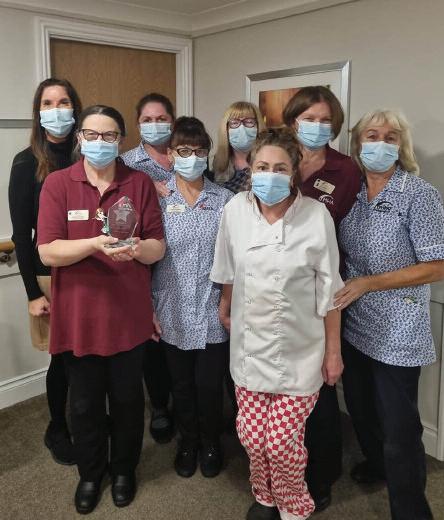
The home provides residential, nursing and residential dementia care for 60 residents Dionne McEwan, home manager said: “I am proud of the team and how they have
“They have learnt a lot from one another and have set the trend for future employees ”
There
These
All
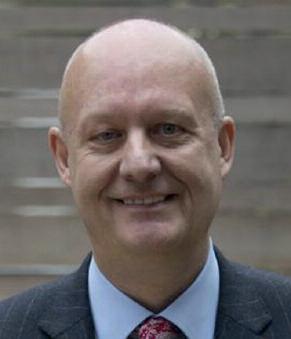
Care England, the largest and most diverse representative body for inde pendent providers of adult social care in England has today expressed disap pointment with the Autumn Statement and its failure to comprehensively address the major fiscal challenges facing the adult social care sector
Professor Martin Green OBE Chief Executive of Care England, says: Last week s Autumn Statement was the latest in a long series of under whelming announcements that have been met with disappointment and dismay by the adult social care sector Over recent months con secutive Governments have had ample opportunity to put in place a comprehensive package of support to finally address what the sector desperately needs in the face of mounting pressures It is a matter of great regret that once again this opportunity was missed There is no denying that the country faces challenging economic circumstances and against that backdrop the announcement of additional funding is welcome However the package put forward does not come close to addressing the funding gap and by no means represents a comprehen sive long term solution to ongoing funding pressures The Chancellor himself called for an extra £7bn a year for the sector during his time as Chair of the Health and Social Care Select Committee a far cry from what he announced last week
Additionally despite the announcement of a long term workforce plan for the NHS no such plan is in place for adult social care With
165,000 vacancies in the sector, more than in the NHS, care providers will continue to be unable to recruit and retain the staff necessary to continue delivering high quality services for people reliant on the care our sector delivers ”
On 17 November the Chancellor of the Exchequer delivered the 2022 Autumn Statement to the House of Commons Among the announce ments relating to social care were:
The investment of an additional £1bn in England in 2023 24, increasing to £1 7bn in 2024 25 Of this £600m in 2023 24 and £1bn in 2024 25 is to move people out of hospital into social care to free up bed capacity Part of this funding will be routed via ICBs and the Better Care Fund, with the remainder (£400m in 2023 24 and £700m in 2024 25) ringfenced for adult social care
• A further £1 8bn in 2023 24 and £3bn in 2024 25 to be distributed via a Social Care Grant split between Adult and Child social care The per centage split is unknown
• The implementation of social care charging reforms namely the cap on care costs, means test and Section 18(3) of the Care Act, will be delayed from October 2023 to October 2025 Funding for implementa tion will still rest with local government
• A Treasury led review of the Energy Bill Relief Scheme will launch to determine support for non domestic energy consumers excluding pub lic sector organisations beyond 31 March 2023 The scale of support for businesses will be significantly lower and target those most affected Following the Statement, Steve Brine MP Chair of the Health and Social Care Select Committee said the: Committee has repeatedly recommended an annual funding increase for social care so the £7 5bn uplift over the next two years is
important However, that is short of the annual increase in funding of £7bn that we have called for Mr Brine was referring to a recommen dation made by the Committee in their recent report into the social care workforce, which stated ‘annual funding for social care should be increased by £7 billion by 2023 24 ’ The report was published while Jeremy Hunt now Chancellor was Chair of the Committee
Care England has this week written to the Chancellor of the Exchequer, the Rt Hon Jeremy Hunt MP, expressing disappointment at the Autumn Statement
Martin Green continues:
“It is becoming abundantly clear that the Conservative Government’s manifesto commitment to ‘fix social care will not be met before the end of this Parliament Adult social care services continue to be over looked and providers and staff despite their selfless efforts to support the most vulnerable in our society are being taken for granted Without significant change the social care system will collapse Inflation which remains at an astronomical level will eat up much of the newly announced funding; a large proportion of which is directed towards the NHS and split between both adult and child care services There are deep concerns within the sector about money going through Local Authorities and Integrated Care Boards who as evidenced by the Covid 19 pandemic are not always held to account to ensure that funds reach frontline services The Discharge Fund while welcome is insufficient and will fail to address the systemic pressures that drive issues for recruiting and retaining staff Social care requires adequate levels of pay training and career progression A complete re think is essential if our sector is to flourish and I fear the necessary reform is not forthcoming ”
Yes, Christmas is coming and we here at THE CARER are offering care homes the opportunity to win a luxuRY SCoTTiSH HAmpER packed with festive goodies!
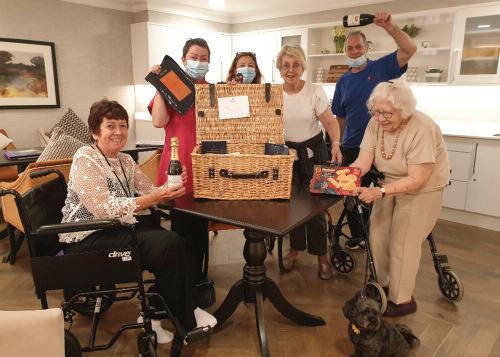
Remember afternoon tea week? We do! That wonderful and quintessen tially British tradition so loved in care homes This year we put up an “Afternoon Tea Week” prize inviting care homes to share the celebrations for afternoon tea week with us
We were overwhelmed with the response we received we are delighted to say care homes all over the country sharing their activities menus sto ries and celebrations which filled 5 pages in our digital issue at www the careruk com/carerdigital114
With the lucky winner being Hutton view care home in Brentwood

So we are launching our Christmas competition and once again a delight ful luxury Scottish festive hamper is waiting to be delivered to a care home who pushes out the boat to celebrate Christmas

All you have to do is briefly tell us what you did at your home to celebrate Christmas menus and decorations details of any festive events you held Christmas fundraising activities or details of the homemade traditional tasty delights you create with a couple of photographs and perhaps quotes from residents and we will pick a winner!
That s it! We will be picking a winner on Friday December 30 and hope fully will be dispatching a luxury hamper to a lucky winner the very same day!
Simply email your entry to nominate@thecareruk com
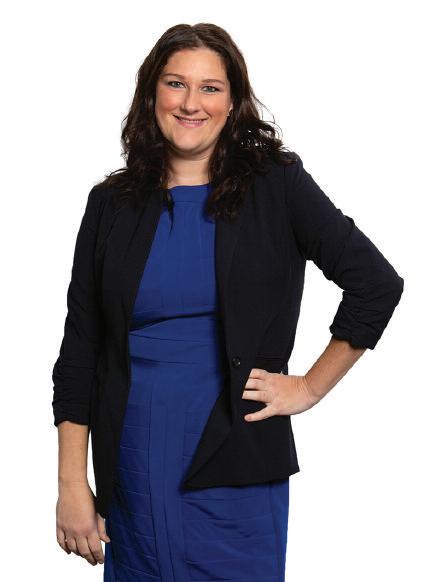
For ‘regulated activities’ such as adult social care safe guarding is non negotiable But are all care professionals aware of this? And how can they use it to embed best prac tice? Kate Oliver of Gateley explores the obligations of a reg ulated activity provider, post pandemic
Most people associate safeguarding with protecting the health and welfare of children and young people While not incorrect this is not the full picture Any activity defined as a regulated activity according to the Safeguarding Vulnerable Groups Act 2006 carries legal safeguarding obli gations and serious ramifications for not meeting them
Many activities involving vulnerable adults are also defined as regulated Broadly speaking they sit within one of six categories: providing health care; providing personal care; providing social work; assistance with general household matters; assisting in the conduct of a person’s own affairs; and conveying (i e transporting a person from one place to another)
Contrary to popular opinion, regulated activity is not defined by the setting in which it takes place or its duration It is the nature of the activity provided to an adult that makes it regulated For example providing physical assistance with eating drinking bathing and dressing will all fall under regulated activity because the adult at that time is considered vulnerable The complexity of this area means it is best not to make assumptions and seek advice when you can Organisations or individuals undertaking regulated activity are required to not only register their activity but also undertake a check from the Disclosure and Barring Service Failure to do so can mean fines and even prosecution
This isn’t just about red tape, though It’s about making sure the sector provides the best quality care pos sible something that is becoming more important based on recent events in the sector
Even before Covid struck adult social care was in crisis High profile inquiries and reports revealed sys temic issues in multiple forms of care provision, most of which were fuelled by a lack of staff, under fund ing, and poor leadership
More recently an undercover Panorama investigation into Edenfield Centre one of the UK s biggest men tal health hospitals revealed what one expert described as a toxic culture of corruption perversion aggression hostility” and a “lack of boundaries”
A robust approach to safeguarding exists to prevent such incidents, through policies and procedures, reg ular staff training and a clearly defined system of reporting and accountability According to NHS England its role is to protect the health wellbeing and human rights of vulnerable people enabling them to live free from harm abuse and neglect
To be successful, safeguarding needs to start at the top Leadership must understand and support the role of safeguarding within its organisation and define how this will be approached and enforced Too often poor leadership is identified as the root of safeguarding issues An inquiry by Robert Francis KC for example traced systemic failings in patient care including ensuring adequate nutrition and hygiene to a manage ment that had prioritised cost savings and status above service provision
As a minimum regulated activity providers must ensure all employees (both existing and potential) undergo a DBS check It is a criminal offence for a barred individual to undertake regulated activity but it is also an offence for employers or voluntary organisations to knowingly allow such an individual to do so
Regulated activity providers must also refer individuals to the DBS if they withdraw permission from a person to engage in regulated activity whether by reason of suspected or known inappropriate conduct
Safeguarding doesn t just mean sifting out individuals with relevant criminal convictions It s also about giving the best quality of life to vulnerable people while ensuring that staff or volunteers are happy and ful filled in their jobs
While it is not all doom and gloom across the industry Covid has created additional problems in funding and staffing As a regulated activity however adult social care providers have a duty to bounce back and embed safeguarding across the organisation from the CEO to the agency staff
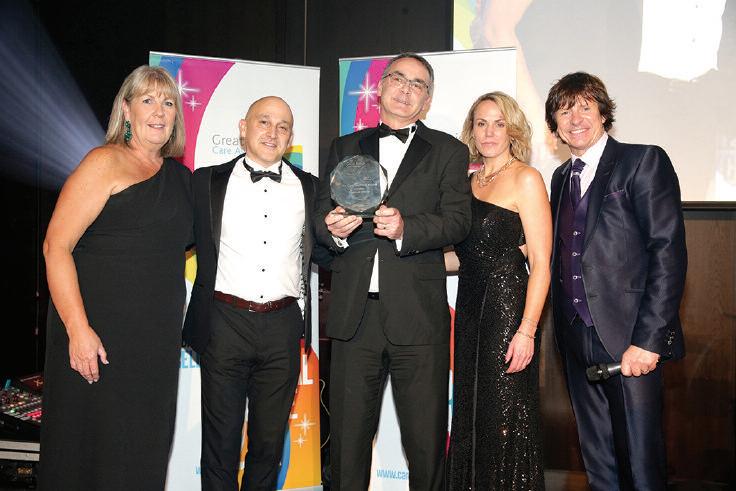
sation who are committed to recognizing valuing and retaining its staff
The Great British Care Awards are a series of regional events throughout the UK and are a celebration of excellence across the care sector The purpose of the awards is to pay tribute to those who have demonstrated outstanding excellence within their field of work
The 21 award categories represent all areas of the social care sec tor whether it be older people or specialist services residential or home care From frontline staff such as care workers and care man agers to people who have made an impact in other ways such as training and innovation
Elizabeth Finn Care Homes won the London region award for best care home employer proving to the judges that they are a well organised and well structured company with a strong ethos and proven practices in place
The judges commented: “This is a strong, people centred organi
“We are absolutely delighted to receive this top award espe cially considering the high calibre of entrants stated Head of Marketing & Communications at EFHL Alex Davies “We have a very hard working and conscientious staff both in the care homes and behind the scenes in administration who embody our goals and ethos in their everyday tasks ”
Chef Andy Hughes at the Elizabeth Finn care home Rashwood, also won Care Home Chef for the West Midlands region going through to the final in March 2023 and Megan Evans was Highly Commended in the Ancillary Worker category
Elizabeth Finn Care Homes operates nine care homes across England and is a wholly owned subsidiary of the charity Turn2us
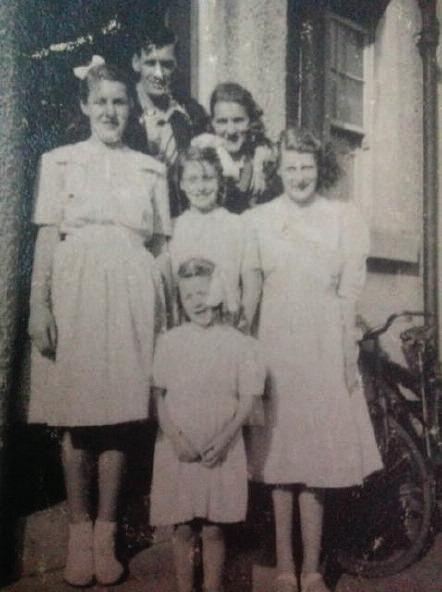
TWO childhood best friends who lived next door to each other growing up in Linlithgow have reunited by chance after losing touch 60 years ago
Irene Gresty lost touch with Janet Henderson when she moved from the area after her husband was deployed by the Navy
The pair both 80 years old had been living just minutes apart at separate Bield developments in Linlithgow for the past three years but despite living so close their paths had never crossed
A recent event hosted by Bield focusing on the use of technology to enable tenants to live more independently helped bring the best friends back together
Irene who lived in a host of countries including Singapore before returning to Linlithgow to reside at Brae Court, said
I moved back six years ago as my family still live here I loved the area growing up so wanted to settle down to enjoy retirement
“From speaking to people I’d known in the past I found out Janet still lived in the area but our paths had n t crossed
“We were joined at the hip growing up as we were neighbours and also went to school together we have many fond memories of sticking up for each other and playing in the park
I just couldn t believe my luck after all these years we just bumped into each other! My heart skipped a beat ”
The two women vowed to never let it go that long again without seeing each other and spent the full afternoon catching up and taking part in discussions about technology in care a major contrast to what they would have been getting up to in the 1960 s
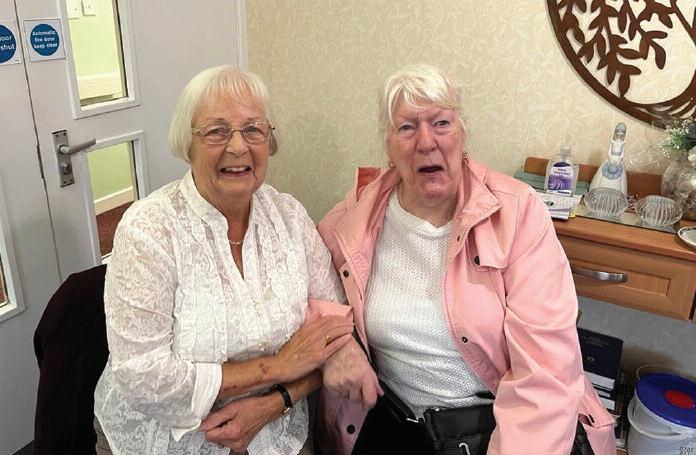
Janet who resides at West Port said
“At Bield you’re always doing different activities and bumping into people you haven t seen in a while but I couldn’t believe I got to reconnect with someone I knew so long ago
“People often move away from the area, and you lose contact it s the way life goes
“We both got married and now have different surnames I hadn’t thought anything of it when someone told me Irene had moved back to the area as I didn t recognise the name so when I saw her at the event it was pretty surreal
We exchanged numbers so I m really looking forward to meeting up in the future, we have many years to catch up on
Tracey Howatt Director of Customer Experience at Bield said:
“We often have friends reuniting after not seeing each other for a long period of time but I don’t think we have ever had anything like this before
“It’s lovely for the two ladies to reunite and it just shows you never know when you’ll bump into an old friend again











In a letter sent to Jeremy Hunt MP Chancellor of the
of
MP
and Steve
for Health and Social Care the House of Lords Adult Social Care Committee says that the Autumn Statement leaves many questions unanswered both in terms of the breakdown of the funding that has been made available, and the Government s strategy and vision for adult social care
The letter which comes in the week before the committee publishes its report A gloriously ordinary life : Spotlight on adult social care also expresses disappointment that the Autumn Statement made no reference to unpaid carers and asks what targeted support has been made available for those who provide ‘the back bone of our health and social care systems
The committee also asks for:
assurances that planned additional funding raised through increased to Council Tax will be ringfenced for adult social care;

clarification on the protection made to the £1 7 billion investment in social care pledged by the government in
the People at the Heart of Care White Paper; clarification on the size and nature of 200,000 more care packages announced in the statement; clarification on how the impact of the additional funding will be monitored Chair of the Committee, Baroness Andrews said:
Whilst we welcome the additional £4 7 billion that has been unlocked for social care in the next three years this falls short of what was recommended to our committee by Mr Hunt himself only a few months ago when he pointed to the estimate produced by the Health and Social Care Committee which he Chaired at the time and indicated the need to provide an additional £7 billion in funding for adult social care in 2023/24 ”
Moreover freezing one area of adult social care policy much needed and long promised to pay for other aspects of the service which are underfunded and understaffed, is not the coherent, realistic long term national plan for adult social care which is so urgently needed
His Royal Highness enjoyed a tour around the care home with Home Manager, Abigail Cranston; RMBI Care Co Managing Director Mark LLoyd; and the Chairman of RMBI Care Co John Boyington CBE Both residents and staff at the newly named Prince Philip Duke of Edinburgh Court had the opportunity to meet the Duke of Kent in person who was pleased to greet everyone around the Home
After the tour The Duke of Kent was invited to unveil an engraved stone plaque to commemorate the official opening of the care home He also met with the teams involved in the construction including RMBI Care Co directors and the archi tects
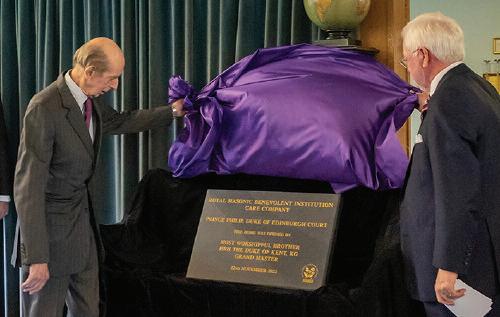


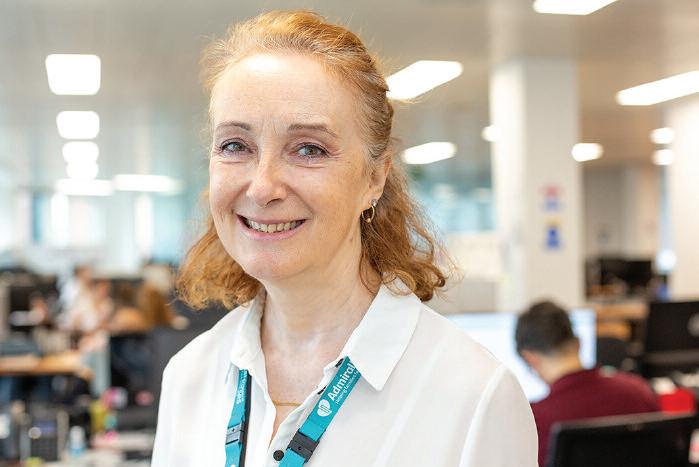 By Dr Rachel Daly, Practice Development Admiral Nurse Consultant at Dementia UK (www
By Dr Rachel Daly, Practice Development Admiral Nurse Consultant at Dementia UK (www
language Taking the time to be with a person who is struggling to communicate is one of the greatest gifts to give them Remember that all behaviour is communication and it is our job as professional carers to TRY HARD to understand and help them If you have a question on helping someone living with dementia you can always contact Dementia UK s Admiral Nurse Dementia Helpline on 0800 888 6678 or email helpline@dementiauk org
T Take a moment Look around what might be wrong? What might that person want or need? Give them your time
R Reactions is the person reacting to you another resident the temperature a noise or something else in the environment?
Y Yearning is the person yearning for something? Are they hungry or thirsty? Are they bored? Do they miss their family? Do they need a hug?
H How can you find out their needs and emotions?Are they sad stressed anxious fearful confused happy or in pain?
Some people living with dementia may have problems communicat ing and expressing their needs which can leave them feeling very frus trated
For anyone providing support to a person living with dementia, think ing about ways to help the person communicate with you could be beneficial Are there picture cards to hand to help the person recognise a picture of what they need (for example the toilet) and point to it even if they cannot say the words? This helps them to express their needs and wants to their carer
Some people can write fluently long after their speech has gone Others may communicate through touch facial expressions or body
A Activities and meaningful occupation how can you engage the person in a way that gives them some sense of choice, control or fun? What did they like doing when they were younger? Would they like to plant some bulbs, go for a walk, or visit other resi dents? If the person is walking consider why are they looking for something or someone? Maybe they have a sore bottom from sit ting too long
R Repetition restate and use their words Reassurance take the time to calm them down and remember they might feel fright ened
D Dos, Don’ts and Distractions Do: Smile, be kind and get on their level Use more non verbal communication like touch gestures
pictures smells and show objects (like the juice box) to enhance understanding
Don’t: be too loud, too fast, or use too many words Don’t argue and remember that it is not important to correct them if they believe some thing to be true(like they need to go home to their mum) Distraction techniques can work well Ask them to tell you about their mum look at pictures or have a cup of tea together give a hand massage or play some music and dance with them if they are able
Music can be a wonderful therapy for people living with dementia and for it to be most effective it needs to be tailored to the individual
Find out as much as you can about the person through Life Story Work which helps to ensure that our care always honours the person as an individual For example what job did they do? Did they have chil dren? Do they have a religion? What are their hobbies? This is often called ‘Person Centred Care’ or ‘Person Centred Practice ’ Ask the per son (if they can communicate) ask their family check their records and note it in the care plan so you can share it with all your colleagues
Think about how the music you like might differ from your friends your partner or your family How can it affect your mood? That will be the same for your residents Some might like jazz or classical music whilst others might prefer music related to their religion If you find a favourite or something that calms them then make a note and use it in situations that they might find stressful If you find a tune that distress es them, make a note of that too to help your colleagues to remember not to play it when they are around Music can be used passively (to lis ten to) or actively (for singing and dancing) try it out always remem bering to keep it personal to the individual

An
MHA
from years gone by Victoria Davidson activity coordinator said:
“The mural took around 2 years to complete as we kept adding to it
“A lot of the credit must go to our chaplain Jane who is by far the
better artist out of us two
She painted the staff members and the likeness is so good
The residents have really enjoyed watching it come together and because of the paintings on the wall they can identify where their room is
“Initially there were no characters planned, however once me and Sally, our other reactivity coordinator, discussed it with staff mem bers they were really up for it and I think they enjoyed it
The mural was definitely the talk of the home and it became something that uplifted the staff members
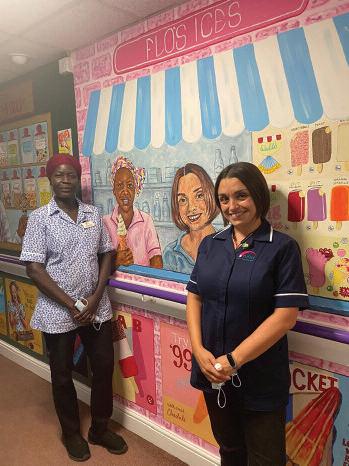
Whenever we do an activity that involves art or some form of creativity I put the final form on the walls to showcase the talent our residents have
“It’s been a very enjoyable task and seeing it come to life as time has progressed has been worth it ”
As part of this, Lakeland Dairies and NAPA will develop useful materials for catering and activity teams to use when combining their skills The ultimate goal is to enhance the everyday wellbeing of people living in care homes and the survey will be crucial in helping improve understanding of what really makes a difference when providing food based activities
The questions for catering staff and activity providers will cover their expe riences of and views on working together to provide enjoyable activities involving food It’s easy to join in the survey online, and it will take no more than 15 minutes to complete Participants take part anonymously and all the information they supply
A new Welsh Government grant scheme to support energy efficien cy improvements and decarbonisation across Residential Social Care providers which will help the sector deal with the cost of energy crisis has been launched and is now open for applications Ministers have announced
The £1 4m scheme is part of Welsh Government s Backing Local Firms Fund, which has been established to support businesses in parts of our local everyday economy also known as the Foundational Economy, to deliver more of the products and services required by the public sector helping to create more and better jobs closer to home The funding being announced today will support residential care providers to implement energy efficiency and low carbon measures helping mitigate the impacts of the cost of energy crisis and move the
sector one step closer to net zero carbon emissions by 2030
Open to residential care providers registered with Care Inspectorate Wales this pilot scheme offers grants of between £30 000 to £50 000 to fund investments such as heat pumps cavity wall insulation double glazing/replacement windows ground source heat pumps loft insula tion tanks and pipes insulation
Deputy Minister for Social Services, Julie Morgan said:
We all have a part to play in tackling the climate change crisis and we must act now if we are to reduce emissions and hit our target of having net zero carbon emissions by 2030 Good progress has already been made within the health and social care sector and we want to ensure social care in Wales is energy efficient ”
This is a fantastic opportunity for social care providers to reduce

their impact of the energy crisis improve their Energy Performance Certificate and make the social care sector more sustainable I encour age all residential care providers to submit an application
Minister for the Economy Vaughan Gething said: Social care is a vital part of our everyday economy providing vital services and jobs in communities right across Wales
“So I’m very pleased we ve been able to make this funding available, which will support social care providers across the country to cut their energy costs ”
Eligible business have until 21st December to apply for funding Information on how to apply can be found by emailing
EnergyEfficientCareHomes@gov wales/ CartrefiGofalEffeithlonORanYnni@llyw cymru
World Kindness Day is an international holiday that was formed in 1998 to promote kindness throughout the world and is observed annu ally on 13th November as part of the World Kindness Movement Team members and residents from Care South’s Dorset House care home in Poole have gone one step further and celebrated a whole month of kindness with many acts of generosity
Throughout the month of November team members and residents walked 14km to raise money and awareness for Alzheimer s Society a vital source of support for anyone living with dementia Residents and staff at Dorset House have also recently celebrated the change of sea son by taking part in their very own Autumn Food Festival with various activities including creating a delicious autumnal fruit pie as part of a Care South wide competition After celebrating lots of seasonal food, the home donated to Poole Food bank which was followed by a church service in the home The service was based around being thankful and the vicar Tess thanked all residents for their support towards the food bank collection
Team members and residents then went onto knit small mice as cat nip toys and gathered donations for Margaret Green Animal Rescue The home received many donations which included dog beds, food, toys and blankets This was followed by a minibus trip to Margaret Green
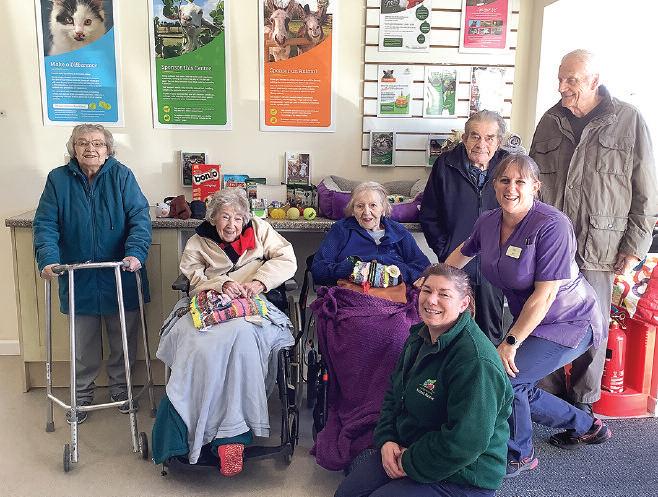
Animal Rescue where staff and residents from Dorset House gave the donations in person and had a personal tour of the centre which was organised by Lucy Hooper Fundraising and Communications Manager at Margaret Green Animal Rescue
Not satisfied with all the wonderful things that they had already done Dorset House went onto gathering more donations to make eight shoe boxes for the Samaritans Purse Christmas Child Operation Residents took pleasure in wrapping the boxes and deciding which items to pack in each box The home got into the festive spirit as they donned their best Christmas outfits so that they could include a picture and a person al message to let the children receiving the shoe boxes know who is thinking of them
Activities Lead at Dorset House, Sam Baker said
This month has really allowed us to reflect upon kindness It has been lovely to be able to give back to those in need and to demonstrate the amount of kindness there is here at Dorset House We have a kind ness tree within the home and we have added some of our thoughts onto this as well as adding the photos of all our acts of kindness which has brought lots of smiles All our donations were supplied by family friends and staff at the home and we were overwhelmed with everybody s generosity ”

Analysis published by the Health Foundation s REAL Centre has found that over the decade before the pandemic the UK spent around a fifth (18%) less on average than the EU14 on day to day health care costs (per person living in the country)
The UK’s total health care budget was £187bn per year on average between 2010 and 2019 (unadjusted for inflation overtime) But if UK spending per person had matched the average across the EU14 over the pre pandemic decade then total UK spending per year would have been £227bn a difference of £40bn more on average every year
The analysis also looked at comparisons with the UK s closest European neighbours In every year between 2010 and 2019 the UK would have had to spend an additional £73bn more to match Germany’s spending per person (39% extra)
When compared to France the UK would have to spend an additional £40bn extra every year (21% extra) Just four countries (Spain Portugal Italy and Greece) in the EU14 spent less per person than the UK over the same period
The charity also looked at capital health spending on vital buildings technology and equipment compara tive to European neighbours Comparing capital spending with the EU14 countries for which data are avail able it found that between 2010 and 2019, cumulative UK investment in capital health infrastructure would have needed an additional £33bn to match the total EU average invested over that period (around 55% high er than actual investment)

The authors argue that the findings set the context for the challenges the UK faced during the pandemic with the UK having lower than average resources for its health care system The UK has fewer practising
physicians per person and fewer hospital beds per person compared to the EU14 This contributed to a healthcare system that was already stretched before the pandemic with the proportion of people in the UK self reported as needing treatment but could not get it was one of the highest in Europe
The findings also show that in response to Covid 19 the UK had the highest increase in health spending in 2020 relative to 2019 amongst European countries In the UK spending increased by 14% compared to the EU14 average of just below 6%
Anita Charlesworth, Director of Research and the REAL Centre at the Health Foundation, said:
As the government wrestles with how to put the public finances on a sustainable footing health spending is under the spotlight as it accounts for almost a third of overall public service spending With 7 million peo ple on NHS waiting lists, staffing shortages, ambulance response times falling, over crowded A&E depart ments and patients struggling to access general practice and mental health the NHS is arguing it needs more not less funding The NHS s own analysis suggests there is a gap of £6 7bn between current funding and the immediate pressures on the service
Over the last decade health spending in the UK has been consistently lower than in other comparable EU countries and it s the cumulative impact of that lower spending that is apparent in the challenges facing the NHS today The NHS has less capacity, making recovering services after Covid a much steeper challenge It s important that health services are as efficient as possible but in the end access to high quality services of a similar standard to our European neighbours can t be sustained if we consistently spend less Either we are going to have lower quality health care relative to other countries or we spend more Balancing the pub lic finances will mean tough choices with potentially harsh consequences for many years to come
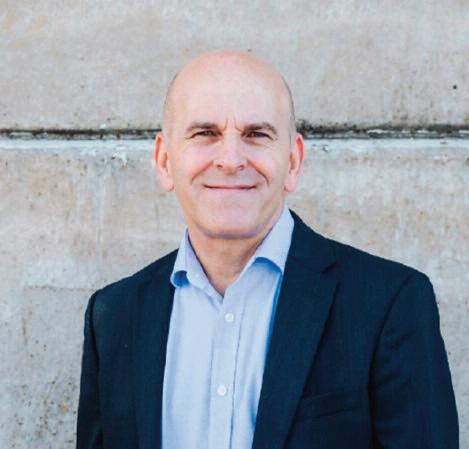
As
Commenting
“The
Speaking
“It
According to The Health Foundation in July 2022, more than 1 in 10 ambulances waited over an hour with patients outside the hospital a huge increase from almost 1 in 50 in 2019 In July 2022 waiting times that exceeded the 15 minute standard reduced ambulance capacity by almost 20%
On September 22nd 2022 Thérèse Coffey announced that there would be a £500 million Adult Social Care Discharge fund to go towards reducing the growing ambulance response times Coffey explained that the fund could be utilised to free up 13 000 patients in beds who should be receiving care in the community However Matthew Taylor the chief executive of the NHS Confederation has said “Leaders across the NHS and local authorities are yet to see a single penny of this investment or any official detail on how it will be allocated ”
The Spring Survey by the Association of Directors of Adults Social Services (Adass) has found that 94% of members disagree that they have sufficient funding to meet the costs of care over the winter This fund aims to ease pressure on clinicians this win ter by speeding up the safe discharge of patients freeing up crucial beds The fund will also contribute to recruitment and retention of care workers With 13 000 patients currently occupying hospitals beds who should instead be receiving care in the community improvements in the flow in emergency departments are desperately needed to reduce ambulance delays How exactly will this £500 million bolster Director confidence? And is it enough to relieve the pressure on hospitals?
£500 million is planned to help hospitals, care home operators, and providers of domiciliary care services, which mainly assist frail and elderly people who live at home with tasks such as eating dressing and getting out of bed However with an estimated 491 633 people on social care waiting lists for assessments reviews or care it feels like this funding plan is a short term solution to a long term problem Health leaders still do not know how and when the £500m will be released to the system But we can all agree that action is sorely needed as currently only two fifths of patients in hospital leave when they are ready to do so owing to bottlenecks and problems accessing social care With that in mind how can the NHS best use the funding to ensure maximum gains?
How it should be spent: A three pronged approach

1 IMPROVING
• Central storage system: Connecting clinicians to a central patient record system via medical grade PCs and tablets will enable them to easily access large data sets and patient histories, helping them to analyse trends in detail and improve patient care Using this information, will improve workflow which will in turn increase the quality of patient care, and provide the right information when updating policies Digital signage: The use of digital signage throughout hospitals can assist patients and staff with navigating the space and reduce wait times by up to 35% resulting in better patient flow and a reduction in delays in
3
2
• Observing the care home environment: Smart cameras can be used to monitor patients and analyse video data to detect if an individual wanders off into restricted areas or experiences a fall Staff no longer need to keep their eyes on the screens and are alerted if anything happens leaving them more time to give one to one care
Touch of a button care: Wearable technology provided to discharged patients will collect data regarding their health status which will help to better inform medical personnel This will enable them to detect ailments early, make better decisions and more accurately assess a patient’s health status
• Smart home care: They can act as a practical central platform in elderly care By bringing health data into a centralised location these home hubs can simplify the monitoring of patients and allow access to remote professional care services This means a doctor can keep a close eye on patients and even interact with them without having to be physically present
Connected communication: Planned funding of £15 million this year will help increase international recruit ment of care workers The funding means that local authorities can support care providers with activities such as visa processing accommodation and pastoral support for international recruits Panel PCs and digi tal signage used in a care home environment will standardize communications methods making it easier for staff to acclimatize and move between different care environments

The digital disconnect between the government and the NHS is starker than ever As the NHS continues to wait for the planned funding patients remain out in the cold To alleviate the financial strain Local coun cils’ efforts should shift towards encouraging Patient Initiated Follow Up appointments This requires sup porting patients to self manage, giving them the confidence to act on changes in their symptoms Funding could enhance this service by giving patients advice and helping them agree on escalation points with their medical professionals Discharged patients could then be responsible for managing their own follow ups and help reduce missed appointments which currently cost the NHS approximately £392 million per year In addition to updating care for discharged patients improvements should be made to the process of dis charging Hospital technology such as self check in systems and smart queue management will not only empower patients, but also staff, who can use the data to prepare for peaks and troughs Mapping out exactly when each site will be at its busiest means that hospital managers can allocate resources effective ly Data can also be used to predict when large orders of certain medicines will be required This can make sure that stock is available during busy periods such as Christmas and New Year
The more data that is available to the Directors of the NHS the more powerful they will be Giving staff and NHS Trusts a full 360 degree view of patient care can only improve processes and help identify bottle necks within a patient’s treatment pathway This data can then be used at a higher level to inform budgets and reduce costs across the country
As we embark upon what is anticipated as the worst winter in recent years for people needing health and social care planned investment for care at home should be accelerated Whether it be improving the tech nology to enable patients to self discharge or creating a safer environment for those who have returned to their place of care changes need to be made
staff She works hard is incredibly flexible and a huge support She is also much loved by resi dents and frequently takes the time to share her knowledge and experience with new people joining our team
We wanted to let her know how much she means to staff and resi dents with a little party some gifts and a massive thank you ”
Carole who started working as a housekeeper at the home in 2008, was presented with a bottle of bubbly flowers and a celebratory cake by Lexie Carole said: “I love working at Fleetwood Hall and looking after the residents and can hardly believe that I ve been here for 14 years!
There s a brilliant atmosphere in the home and the staff all get on really well I was touched to be given such a lovely thank you from everyone
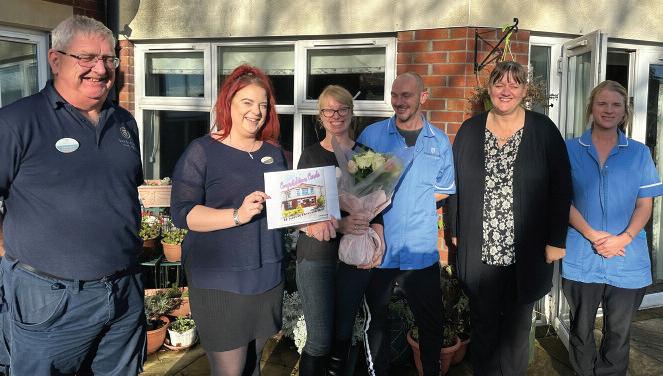
He said the collapse of care homes would damage the quality of life of elderly residents and added: We cannot allow, in the midst of the current crisis, the quality, care and provision of older people to be sacri ficed simply because people are not attending to the real issues that are facing the sector
Mr Macaskill also questioned the plan to create a national care service while the system is under such pressure He said: “We need to look at the now and we need to attend to the crisis of the moment rather than dreaming of the future which we all want to achieve and we want reform but we need to get to that stage otherwise there is nothing to reform
“I think we need to get our priorities right and the national care service is a priority but it’s not the imme diate one and I think we need to talk seriously about focusing our efforts on the now Depute SNP leader and Justice Secretary Keith Brown described the situation in Scotland as “serious” He said: “It s a serious situation and I think that’s been acknowledged by the health secretary The priority now is to try and get a pay deal over the line to make sure we can keep people at work “The structure of the situation in the UK whereby the health consequentials very much relate to what the UK government’s priority are mean that I think for years now we failed to match other European countries ”
Cygnet Health Care has launched a new carers pass port to improve the experience for car ers looking after adults with mental health and learning disabilities
The carers pass port, a record which identifies a person as a carer and sets out an offer of support will help to improve and embed identification, recognition and support for car ers
the support they provide We put service users at the heart of what we do but we also understand this can be a stressful time for families and carers in particular
“We want to work in partnership with carers and we want to make carers visible across our services Carers are essential partners in the care of the people they support, so across Cygnet we wish to involve them and support them wherever possible That is why we are very excited to be launching Cygnet’s first ever Carers Passport ”
The family and friend Carer Passport will not only help individuals identify themselves as a carer it will allow Cygnet Health Care staff to immediately recognise a carer The card is a credit card size and can be carried in your purse wallet or bag

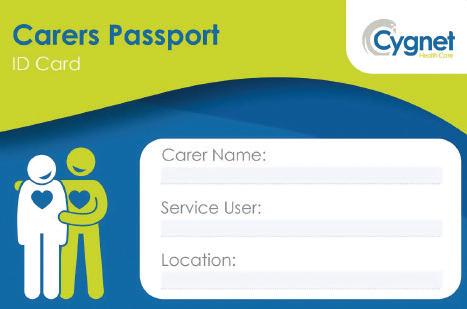
charge of the patient or service user Carers should be involved with staff to devise care plans for their loved one and across the board staff are making a commitment to share information with carers in a timely manner That is why it is so important we are introducing a way for carers to readily identify themselves to staff
Cygnet also recently launched its Carers Network, a new initiative aimed at offering an increased level of support to carers involved with Cygnet’s national services
Through the network carers will be able to access practical support and advice from Cygnet professionals on the management and sup port of people with a learning disability and behaviour that challenges, as well as on managing their own health and wellbeing Carers will also be able to help shape the design and improvement of Cygnet services
at the company’s first Regional Carers Network
It was officially
held at Cygnet Churchill on Thursday 24 November
and featured presen tations from a range of expert speakers
The passport is part of a commitment made by Cygnet Health Care to involve carers in the Triangle of Care whereby carers service users and staff work collaboratively to promote recovery and wellbe ing Carers and the essential role they play will be identified at first contact with services or as soon as possible after and staff will be trained to engage with carers more effectively
David added: By introducing a Carers Passport we are better able to involve them in discussions about the care, treatment and dis
David added: “From a carers point of view it s important to have your voice heard particularly when it comes to improving and access ing services and in the long term we hope the network can also con tribute to the wider debate on the future of mental health care so that it effects real change for those carers looking after an adult with an enduring mental health condition or learning difficulty ”

A new national trial aims to use pandemic lessons to help quickly find effective treatments for people hospitalised with severe flu
The £2 9 million REMAP CAP trial will work with the National Institute for Health and Care Research (NIHR) to recruit children and adults hos pitalised with severe flu from 150 hospitals across the UK over the next two years It will be run by researchers and clinicians from Imperial College London and Imperial College Healthcare NHS Trust in collabo ration with other national experts It is funded by the NIHR and deliv ered by the NIHR s Clinical Research Network
This is the first time a trial of this kind will be used for flu The REMAP CAP trial was originally set up to tackle pandemics It is exactly two years since REMAP CAP showed in COVID 19 how reducing inflammation with the drug tocilizumab can save lives in severely ill patients
The trial is designed to provide answers quickly by using a robust yet rapid approach to test multiple treatments at the same time in thousands of people The trial will be highly adaptive allowing the team to learn quickly from early results and ensure people are given treatments that show encouraging results as soon as possible Professor Anthony Gordon Chief Investigator of the new trial from Imperial College London s Department of Surgery and Cancer and Consultant in Intensive Care Medicine at Imperial College Healthcare NHS Trust said: During the pandemic our trial was able to rapidly respond to a new virus and our approach helped save lives We re now redeploying it against a known threat Flu is very infectious and can make children the elderly and vulnerable people seriously unwell in some cases
This winter we might see more flu cases than usual as the virus potentially resurges after pandemic measures have kept levels low
We hope that our trial will help to find urgently needed flu treatments rapidly Our COVID 19 trial changed clinical practice globally, and we hope we can impact flu treatment and reduce winter pressures on the NHS in the same way ”
Running for two years (in the first instance) the trial aims to recruit several thousand people, and will test multiple treatments These include the anti viral treatments oseltamivir (also known as Tamiflu) and baloxavir as well as steroids and anti inflammatory drugs that were found to be effective against COVID 19 in the original REMAP CAP trial [1] More treatments may be added in the future
Dr Elizabeth Whittaker, a Consultant in Paediatric Infectious Diseases at Imperial College Healthcare NHS Trust and a Senior Clinical Lecturer in the Department of Infectious Diseases at Imperial College London, is leading the children s part of the trial She said Flu can be a very seri ous illness for some children in some cases leading to hospitalisation
and problems like bronchitis and pneumonia
Getting the free spray flu vaccine is our first line of defence and drastically reduces the risks for children But we also need more treat ments to help those children who do become very ill which is why this trial is so important
“Working with a range of experts across the country, we hope to determine the best treatments for flu and ultimately save lives
Minister for Health and Secondary Care Will Quince, said:
Clinical research was vital in our fight against Covid and helped to save thousands of lives across the country
“This innovative trial will use the lessons we learned from Covid and deliver treatments to reduce serious illness in patients with flu ease pressure on the NHS and ultimately save lives
While this trial aims to prevent illnesses for future flu seasons we are now seeing increased levels of flu this year, and it is vital that all those eligible for a free vaccine come forward as soon as possible
The researchers will study how effective the treatments are at reducing deaths from flu and stopping patients needing intensive care
To help them to determine which treatments provide the best use of NHS resources the researchers will also monitor whether the treat ments reduce severe symptoms stop people needing breathing sup port, and shorten the amount of time people stay in hospital or intensive care The researchers will also measure quality of life and disability after recovery
Using this approach we can bring in new treatments and test them thoroughly against one another without having to stop and start trials Typically you’d need a new trial for every treatment which takes time Instead this type of trial keeps research rolling explained Professor Gordon
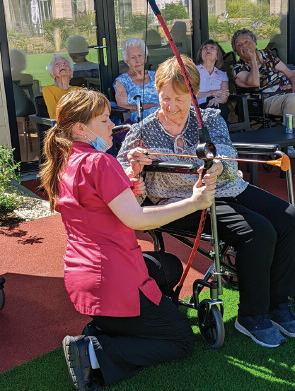
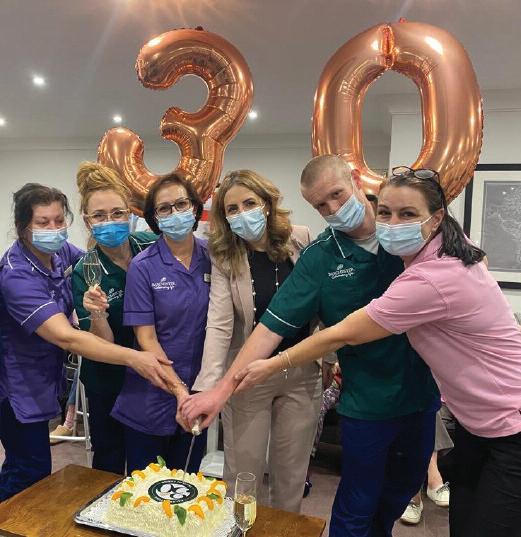
Parent company Barchester Healthcare who run Chorleywood Beaumont
out in 1992 with just one care home Moreton Hill in Stonehouse Gloucestershire Fast forward 30 years and Barchester is now the second largest care home company in the UK with 250 care homes and private hospi tals all over the country
To celebrate Chorleywood Beaumont threw open its doors on Friday 25th November from 2 30pm for a fantastic Putting on the Ritz Party and everyone was invited!
The party had a live entertainment with Fiona Harrison and her Putting on the Ritz show and got everyone up sing and dancing Head Chef Annette and her team laid on a beautiful afternoon tea with plenty of fizz for everyone to
us to help us celebrate 30 years of Barchester
Dr
commented: I am incredi bly proud of everything we have all achieved as a company
from just one home in 1992 to 250 high quality homes and hospitals delivering person alised care to each of our residents today, it really is phenomenal I want to thank all our amazing teams and our wonderful residents, I hope everyone had a brilliant time celebrating this important milestone for Barchester and for us all ”
There are no secrets I used to work outside when I was younger and you just try and be healthy ”
Julie Roche, home manager said “Joe moved into MHA Westbury Grange in April 2021 and was born in Waterford Southern Ireland in 1917
Joseph received plenty of cards from family and friends including a West Ham United themed card the football team he supports

Prior to moving into Westbury Grange he lived in Upton Park which was where The Boleyn Ground, the former home stadium of the club was
There was plenty of singing and dancing to celebrate his birthday along with a special birthday cake
Speaking after his party he said: I really enjoyed my birthday especially the dancing “It was a nice day, one which I really enjoyed, and I really like living at the home
He had six sisters and one brother and talks about his father and mother quite a lot
As a child Joseph liked fishing collecting stamps and gardening
“After school he worked as a paver He met his wife Mary after the war and they were together for 50 years
“They were married in April 1948 in Stratford and had three children one of them his daughter Catherine lives across the road from the home
Joe still loves to chat and will happily speak about his life he loves his food and snacks almost 24 hours a day ”
Garylee
NHS patients are set to benefit from cutting edge new treatments and technologies as the government introduces a Vaccine Taskforce style approach to tackling some of the biggest public health chal lenges facing the UK
The government has announced over £113 million to fund research into 4 healthcare missions cancer obesity mental health and addic tion to unlock the next generation of medicines and diagnostics to save lives transform patient care and ensure UK patients are the first to benefit from medical breakthroughs
Building on the Vaccine Taskforce model which led to one of the most successful vaccine roll outs in the world and ensured millions got a COVID 19 jab the government will continue to harness world leading research expertise, remove unnecessary bureaucracy, strengthen part nerships and support the new healthcare challenges
Since the Life Sciences Vision was first launched it attracted £1 bil lion investment to the UK and this further research funding is expected to gain investment from leading global companies
In addition tackling these healthcare challenges could save the NHS and the economy billions of pounds it is estimated obesity costs the NHS £6 1 billion a year and poor mental health costs the economy £118 billion a year
The Prime Minister Health and Social Care Secretary and Business Secretary will today meet with key industry figures including global CEOs, NHS leaders and industry experts at the Life Sciences Council to discuss how their support will deliver life changing innovations to patients, boost NHS efficiency and ensure the UK remains a global life sciences superpower
The Prime Minister, Rishi Sunak said: "The NHS faces real pressures, which is why we are investing over £100 million in the technologies and medicines of the future to address some of the biggest public health challenges facing our country
This funding will improve outcomes for patients ease existing pres sures on the system and ensure that we are among the first to benefit from medical breakthroughs Importantly it will also help save the NHS millions of pounds that could otherwise be spent on patient care for example by tackling obesity which costs the health service over £6 bil lion annually
It is hugely welcome too that the highly successful Vaccine Taskforce, which procured millions of life saving vaccines in record time during the pandemic will now become a blueprint for how we
harness the best talent and expertise from around the world and drive investment in research and development "

Health and Social Care Secretary Steve Barclay said: Conditions such as cancer and obesity prevent people leading long healthy lives and cost the NHS billions of pounds every year
We re leading the way in cutting edge research which can find new ways to speed up diagnosis, enhance treatments and ensure a better quality of life for patients both now and in the future
"By harnessing the same spirit of innovation that delivered the vac cine rollout and working hand in hand with the NHS industry and healthcare experts
"We’re building a stronger healthier NHS with record numbers of staff and record funding to give people the security of knowing it will be there for them when they need it " The research will focus on the top public health priorities, as identified by the NHS:
• CANCER: £22 5 million will go into cancer research to develop new immune based cancer therapies including cancer vaccines which are targeted to a patient s specific cancer Funding will also support the development of technologies that enable earlier, more effective cancer diagnosis This will support progress towards the NHS Long Term Plan ambition to diagnose three quarters of cancers at stages 1 or 2 by 2028
• MENTAL HEALTH: £40 2 million for research into mental health to develop and introduce digital technologies to support patients This could include technology allowing patients to monitor their mental health at home and instantly report to their doctor if in need of help Funding will be spent in the Midlands and the North to bolster services and ensure people across the UK can access support helping level up health across the country With one in 4 adults experiencing mental ill ness poor mental health costs the economy £118 billion a year OBESITY: £20 million to trial how best to deliver new medicines and technologies for people living with obesity particularly in deprived communities across the UK This will help new medicines coming to market some of which have the potential to reduce a person s weight by more than 20% to better support people to achieve a healthy weight The mission will explore how these medicines can be combined with cutting edge technologies and digital tools to improve long term health outcomes Obesity costs the NHS £6 1 billion a year and helping people lose weight and lead healthier lifestyles could lead to signifi
• ADDICTION: £30 5 million including funds contributed through collabo ration with Scottish Government, will be deployed to accelerate the development of new technologies to prevent deaths from overdoses across the UK This could include wearable devices which can detect the onset of a drug overdose and signal to first responders to prevent deaths and better support people with substance use disorders to manage and combat their addiction Funding will also help grow research capacity and capability across the UK to better understand addiction and the most effective ways to treat it as a chronic health care condition
The new funding follows the launch of the dementia mission in August 2022 in memory of the late Dame Barbara Windsor backed by £95 million to develop innovative research tools and boost the num ber and speed of clinical trials in dementia and neurodegeneration
This contributes to the commitment to double funding for dementia research to £160 million a year by 2024 to 2025
In line with the Vaccines Taskforce, the 4 healthcare missions will be led by an independent chair an expert in that field to accelerate the development and introduction of the latest treatments and technology into the NHS as well as drive collaboration across partners This will not only ensure better care for patients, but also improve the accuracy of diagnosis and free up clinician time, helping tackle the COVID 19 backlog and ease pressure on health services
The launch also sees Innovate UK launch a new £30 million fund to advance life changing cancer therapeutics delivered through the Biomedical Catalyst (BMC) programme This new programme directly supports the UK government’s cancer mission combining expertise in immuno oncology and the vaccine capabilities developed throughout the pandemic
Minister of State for Health Will Quince said: We have made immense strides in health research over the past year and it’s crucial we continue to harness this enthusiasm and innovation
These new healthcare missions commit to putting the lessons we ve learnt into action to drive the UK forwards as a life sciences superpower
By bottling up this scientific brilliance our Life Sciences Vision puts this innovation at the heart of our health service helping to solve major health challenges such as cancer and obesity and enabling the NHS to continue delivering world class care
We have a common saying in Chinese culture: Bad things that hap pen in the family stay in the family In our community a diagnosis of dementia is often swept under the carpet due to shame
Having grown up in Hong Kong and in a Chinese family, I’m all too familiar with this attitude
Five years ago, I started noticing changes in my grandma s behaviour She would buy the same shopping items repeatedly and the kitchen would be bursting with crockery and utensils We figured her forgetfulness was just a natural part of getting older
It wasn’t until she was admitted to hospital with hyperglycaemia (high blood sugar) that we got the full picture of what she had been going through
Grandma had been overeating all hours of the day and throughout the night She was confused and forgetful because she was experienc ing trouble with her memory We weren t aware of just how much she was struggling and it was probably because she didn t want the family to worry about her She was diagnosed with dementia and this was just the beginning of her journey
Little did I know that I would end up supporting families living with dementia in Hong Kong at a community health centre I ve brought this experience to the UK to work as a Clinics Admiral Nurse at charity Dementia UK I’m delivering a first of its kind Clinics service for fami lies with dementia from the London Chinese communities in partner ship with the Chinese Welfare Trust
As I can speak Cantonese and Mandarin fluently I communicate with families from this community and provide tailored clinical advice and emotional support

It is estimated that there are more than 25 000 people currently liv ing with dementia from Black Asian and minority ethnic groups which includes the Chinese community in England and Wales 1 This is expect ed to exceed 172,000 people by 2051
Research suggests people from ethnic minorities including those from the Chinese community, often face delays in getting a dementia diagnosis and barriers to accessing services 1
In Chinese culture there is a real stigma surrounding dementia It is
quite common for a family member to receive a diagnosis of dementia or suspect a diagnosis and to keep it a secret from the family In some cases the family may hide it from others due to the shame surrounding the condition
The traditional term to describe a person with dementia translates as ‘silly’ or ‘dumb’ in Mandarin and Cantonese In many Chinese speaking societies the term has been replaced with a more neutral word to remove this stigma and adopt a kinder approach, but there is more progress to be made Dementia UK s Admiral Nurse Clinics Service along with the Chinese Welfare Trust, has adopted this modern term to empower families from the community
It is even more common for symptoms of dementia including forget fulness to be considered a ‘normal’ part of aging which means some people never get a formal diagnosis Many families in the community do not receive vital information about dementia, including information on signs and symptoms and diagnostic and post diagnostic services This is largely due to difficulties in navigating health services as a result of language barriers lack of information and access problems
According to research findings there is a strong sentiment in the Chinese community around both needing and wanting professional medical support but being reluctant to seek it if it comes at the cost of being ‘diminished’ as a person 3 This is either through shame in the family or through the navigation of the health and social care system
Death is considered a taboo subject in Chinese culture and is not spoken about openly This can cause huge challenges when it comes to arranging end of life care Following a diagnosis of dementia it is vital that the person can discuss and organise care plans while they still have the capacity and cognitive abilities to make decisions regard ing their future
Moreover in our culture younger members of the family are often expected to look after their elderly relatives This dynamic can place additional stress and burden on young carers and cause friction in fam ilies around caring responsibilities It is not uncommon for families in the Chinese community to look to health and social care professionals to mediate these conversations around care As an Admiral Nurse working with the whole family to manage complex needs is central to my day to day work
My role as a Clinics Admiral Nurse, has spurred me to share my knowledge of Chinese cultural practices beliefs and values with col leagues, so that we continue to work towards tackling existing inequal ities in dementia care
This is even more important as dementia is a huge and growing
health crisis; the estimated number of people living with the condition in the UK is 944 000 This number is set to increase to 1 1m by 2030 Almost all of us will know someone affected whether it s a family member or a friend But there simply aren t enough Admiral Nurses to reach every family that needs support With gaps in health and social care services barriers that the Chinese community face to accessing support and the stigma around dementia it is vital that we begin to educate and raise awareness among health and social care profession als so they can begin to address these issues
Information about dementia and the services available need to be easily accessible and translated into different languages so that we reach these families and break down the stigma which leads to isola tion Delivering personalised care is also critical Getting to know not only the person with dementia but their whole family can enable healthcare professionals to better understand cultural attitudes and how they intertwine with care needs This might involve broaching con versations around end of life care with sensitivity or providing a space for families to share concerns around caring responsibilities and expec tations For now Admiral Nurses like me with the support of Dementia UK are uniquely placed to provide life changing guidance and inspire change within the dementia care system
My grandma remains at the forefront of my mind every day No per son or family should have to face a diagnosis of dementia alone; we should walk through the change together and tackle the stigma around dementia in the Chinese community so that all families get the support they need
Dementia UK s Admiral Nurse Clinics service in partnership with the Chinese Welfare Trust is available to families residing in registered with a GP or who are a member of one of the Chinese Welfare Trust’s local community partners in the London boroughs of Barnet Brent Camden, Tower Hamlets and Westminster To find out if you meet the referral criteria for the Chinese Welfare Trust Admiral Nurse clinic please call 020 3870 9350 or email CWTANclinic@dementiauk org
To find out more about becoming an Admiral Nurse speak to the team at Dementia UK by emailing admiralnurserecruitment@dementi auk org or for more information visit https://www dementiauk org/for professionals/admiral nurse careers/
increase rapidly during the final three months of life with out of hours visits increasing more than visits during standard office hours
In 78% of the areas surveyed in today’s Better End of Life report nursing services were not consistently available to dying people overnight at home despite 75% of the week falling out of hours Furthermore 69% of areas did not provide a 24/7 designated tele phone line for people approaching the end of life and their carers that can connect them quickly and easily to local services Of these 27% of areas had no designated phone line at all while 42% had only partial coverage out of hours
This is despite repeated recommendations to implement this serv ice from The National Institute for Health and Care Excellence (NICE) over the last 10 years
Accessing vital medicines out of hours was also difficult with only 25% of areas having a pharmacy open throughout the night This has led the end of life charity, Marie Curie who funded the research undertaken by King s College London s Cicely Saunders Institute Hull York Medical School at the University of Hull and the University of Cambridge to describe the situation as “bleak ” adding we cannot tell people to die during office hours to get the care they need
Pain and other symptoms can suddenly increase when someone is nearing the end of their life, so fast responsive care is needed around the clock Fears about dying without dignity or without their loved ones present can cause further distress
Gaps in out of hours care the researchers say can lead to avoid able trips to stretched hospital A&E departments The researchers found that over a year approximately 780 000 out of hours visits were made to A&E for people in the last year of life These visits
The research also found out of hours emergency visits to hospital are higher in areas of social deprivation Both the charity and researchers say that dying people in deprived areas should not have to rely on emergency hospital departments for the help and care they need
Better palliative care in the community including out of hours could play a key role in reducing pressure on emergency services improving both the quality of life for dying people and protecting pre cious NHS resource
Ruth Driscoll, Marie Curie Associate Director of Policy, and Public Affairs said:
“This research paints a bleak picture of out of hours care in many areas of the UK but we cannot tell people to die during office hours
“Caring for a family member or friend is a final act of love but the reality is that a lack of care especially late at night is causing unnec essary pain and distress to patients which often leaves families feeling that they have let their loved one down
“A designated phoneline is considered crucial for out of hours care and one of the most valuable services that can be offered to patients and their carers It would also help prevent avoidable emergency admissions to hospital which increase pressure on an already stretched NHS
“There must be high quality care available for dying people 24 hours a day seven days a week to all who need it regardless of where they live ”
Professor Katherine Sleeman from King s College London and lead researcher on the Better End of Life programme said:
Our research uncovers considerable variation in the care and serv ices that are provided in the evening or at weekends across the UK If
“Because
Professor Fliss Murtagh Director of the Wolfson Palliative Care Research Centre from Hull York Medical School at the University of Hull, and one of the researchers working on the Better End of Life pro gramme said:
“Throughout the UK, major reliance on district nurses or community nursing teams for out of hours palliative and end of life care was evi dent
Services are often available in principle but our research revealed large gaps between what was technically available and delivery ‘on the ground Care often relied too heavily on over stretched GPs and district nurses, who do their best but cannot always reach those need ing support in a timely way
As a result of the research Marie Curie is recommending that every area of the UK should have a designated 24/7 palliative and end of life care telephone line This should be staffed by experienced pallia tive care professionals so that people at the end of life and their car ers can get the advice guidance and support to access local services and medication that they need rather than having to call 999
The charity also says that investment must be made to ensure there is a sustainable workforce able to meet the current and future needs of dying people in our ageing population
To download the full research please go to Mind the gaps: under standing and improving out of hours care for people with advanced illness and their informal carers at https://tinyurl com/4buy9e8t
Researchers based in Chicago have revealed a possible link in diet and cognitive decline examining the effects of antioxidants called flavonols on brain health in later life
The study was published in Neurology the medical journal of the American Academy of Neurology



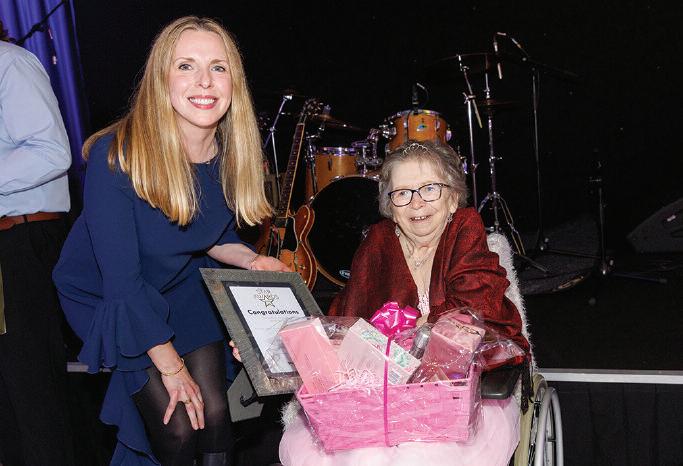

Flavonols are a type of chemical found in plant pigments These are known to have antioxidant properties which may be beneficial for our health Fruit, vegetables, and some drinks such as tea and wine are good sources of flavonols but can a diet rich in flavonols protect against declin ing memory and thinking abilities as we age?
The study investigated 961 people with an average age of 81 who live in Chicago The participants filled in questionnaires about their diet from which researchers estimated their consumption of flavonols and per formed cognitive tests which measured different memory and thinking abil ities over several years The researchers used this data to try to find out whether a diet high in flavonols led to a slower decline in memory and thinking as the participants aged

They found that people who consumed higher levels of flavonols through their diet (for example through eating fruit and vegetables and drinking tea) tended to show less of a drop in their memory and thinking test scores over the course of the study The researchers found that two particular types of flavonol commonly found in kale and tea were more strongly linked to slower cognitive decline than other types of flavonol

“Our diet is just one factor that can affect our brain health and researchers are still trying to pin down to what extent specific dietary components like flavonols affect our memory and thinking abilities
“Previous studies indicate that flavonols can help protect brain cells from damage which has led to researchers investigating their potential role in slowing cognitive decline This new study also looks at how different types of flavonols could affect our brain health something that has not been researched in detail before
While the researchers tried to establish how flavonols play a role in slow ing cognitive decline it is always difficult to rule out other factors that could influence the results of this type of research As the participants were on average 81 years old at the start of this study their lifestyle in the years leading up to the study is likely to have affected their risk of cognitive decline
“What we can say for now is that there is a wealth of evidence which points towards eating a balanced diet as a way to reduce risk of cognitive decline A diet rich in fruit and vegetables along with plenty of exercise and not smoking contributes to good heart health which in turn helps to protect our brain from diseases that lead to cognitive impairment or dementia If we manage our diet and physical activity through out our lives that is a crucial step towards better brain health in later life
Encore Care Homes has introduced a dedicated new role to the team to provide a boost to the wellbeing of residents with dementia
Sue Lanceley has been promoted to Group Dementia Specialist Nurse due to her wealth of experience of dementia Encore which has four care homes providing round the clock residential dementia nurs ing and palliative care across Dorset and Hampshire has created the new role focusing solely on the experience of residents with dementia and, where necessary, providing additional support to their relatives Sue brings vast experience to her new role having worked in elderly care throughout her entire adult career She says that she has spent the past 10 years specialising in dementia care as she feels there is more that can be done within the overall care sector to understand and work with people with dementia Across Dorset alone there are an esti mated 10 000 people living with dementia and that number rises to 18,000 in Hampshire
Sue will be working in Encore s four care homes to introduce ongo ing enhanced dementia training to the care teams to establish new ways of enabling older people with dementia to live safely and com
home teams and relatives as a resident s needs change to ensure that they receive the best possible support
Sue said “It s a real honour and a privilege to be able to further sup port our residents with dementia to live happy fulfilled lives with us with the support and guidance of their families The families of our resi dents are so important as they know their loved one better than any one so it will be incredibly rewarding for me to work with them to continue to do what is best for their loved one We have dementia communities in all four of our care homes and so it will be great to help us deliver an even higher standard of care for those residents ”
The Encore family includes Great Oaks in Bournemouth Oakdale in Poole Fairmile Grange in Christchurch and Hamble Heights in Fareham
The Encore team provides care for residential nursing dementia and Alzheimer’s, palliative, and respite residents This includes a dedicated Wellbeing team in each care home who are on hand to organise fun activities to support each resident s physical, emotional, and holistic wellbeing


ed him of his childhood, growing up in Sandwich, Kent He even shared his fond memories with the group Prince George Duke of Kent Court s Activities Coordinator Diane Connor said:
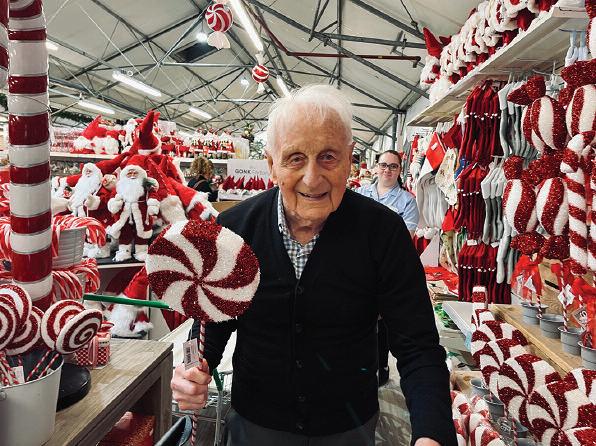

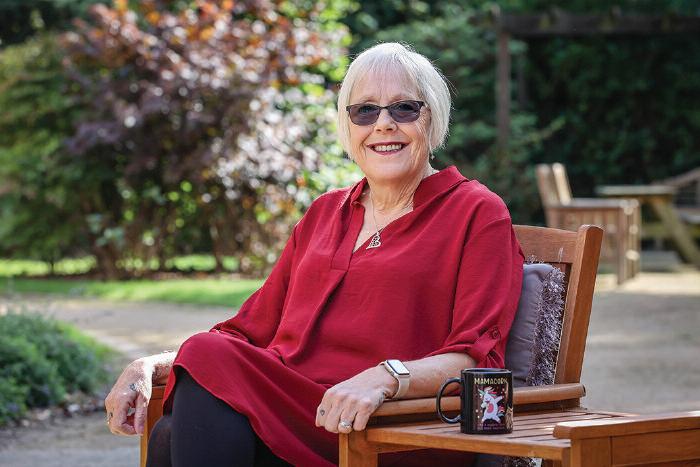
“Our residents had a fantastic time get ting into the Christmas spirit and immers ing themselves in their local communities We often find that nature the environ ment or simply having a change of scenery can evoke memories as well as create new ones so we re keen to support our residents to have different experi ences
of year ” said resident Edna Rockall at the Home which supports
residential dementia support
loved the journey to the garden centres saying the green fields remind
“The Christmas trips are just the start of festive events at our care home During December we ll have a busy schedule which includes Christmas carols singers staff celebrating Elf Day local school visits and of course, Christmas isn’t complete without a visit from Father Christmas
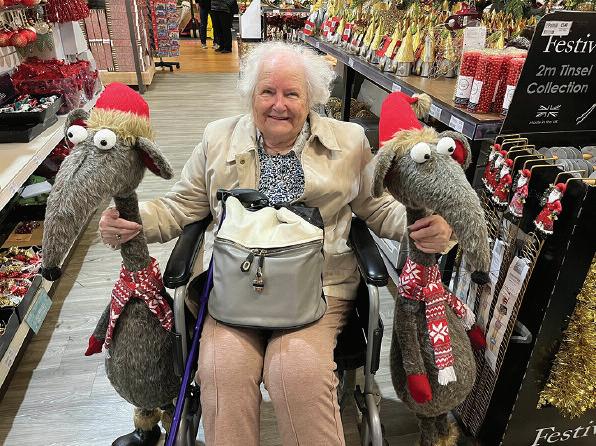 fortably She will also be acting as a point of contact between care
fortably She will also be acting as a point of contact between care
The Government’s recommitment to delivering the Dame Barbara Windsor Dementia Mission has been warmly welcomed by Alzheimer s Research UK the UK’s leading dementia research charity
Launched in August by Boris Johnson the Dame Barbara Windsor Dementia Mission will help speed up dementia research and contribute to the Government s goal of doubling research funding to £160m by 2024/25
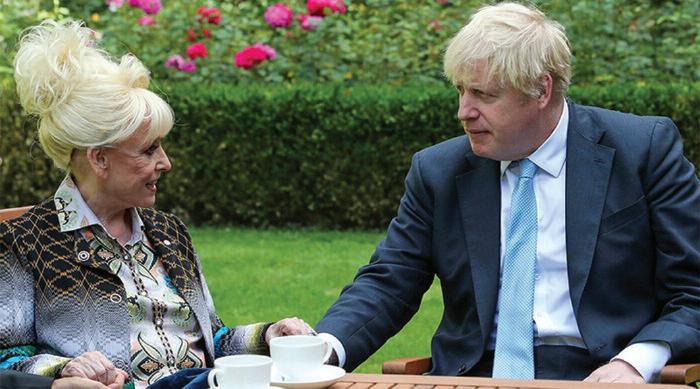
David Thomas Head of Policy at Alzheimer s Research UK said: “We campaigned heavily for government to accelerate efforts to develop much needed dementia treatments So we are delighted to see the Government move forward with the Dame Barbara Windsor Dementia Mission Now these promises need to be quickly turned into action, as the need to find life changing treatments has never been more urgent
Part of the pledge will be to apply lessons from the success of the Covid Vaccine Taskforce to dementia research For this to happen industry the NHS, academia and families living with dementia must come together to accelerate the breakthroughs that will transform the people’s lives
Extra funding will also help boost the number of clinical trials and innovative research in the UK accelerating the progress that s urgently needed
For this vision to happen Alzheimer’s Research UK says the Government needs to focus on three priorities: Identify the most promising experimental drugs to take forward from the pipeline of potential dementia medicines
Create a network of high performing clinical trial sites across the UK so these promising new dementia drugs can be quickly tested Use the latest cutting edge diagnostic tests to help match the right people to the right clinical trial at the right time
The charity believes that collectively this will make the UK a more attractive location to run late stage clinical trials in dementia David Thomas Head of Policy at Alzheimer s Research UK contin ued:
The UK has a rich heritage in dementia research With the right
action, the Dementia Mission, together with increased funding, will allow the UK to keep its place as a global leader in dementia research bringing forward the changes that people with dementia
Dr Susan Kohlhaas Director of Research at Alzheimer’s Research UK said:
Decades of painstaking research have finally brought new dementia treatments within reach We’re now in an era where incredible break throughs for people with dementia will become a reality
“The Dementia Mission gives us a huge opportunity to build on this momentum but we need to make sure we have the investment in our clinical trials infrastructure so the most promising drugs can be deliv ered quickly to those who will benefit the most ”
Professor Jonathan Schott Chief Medical Officer at Alzheimer s Research UK, said:
After many years of waiting we are edging closer to new treat ments that can alter the progression of Alzheimer’s disease and other forms of dementia and make real differences to patients Such advances are only made possible through research and volunteers who are willing and able to enter clinical trials
The UK has a rich history of research advances in dementia but cur
rently very few patients are offered the opportunity to participate in tri als of new therapies It is vital that the Dementia Mission addresses this urgently providing the necessary infrastructure personnel and access to diagnostic tests to maximise participation and to match the right people to the right trials at the right time
Figures collated by Alzheimer s Research UK earlier this year revealed shockingly low participation in late stage dementia trials compared to other major health conditions
Josephine’s involvement in dementia research began after she was diagnosed with Primary Progressive Aphasia (PPA), a rare type of dementia that primarily affects speech and language, in 2011
Josephine, a former senior civil servant volunteered for research studies for several years to help scientists better understand PPA and speed up the search for treatments
Her son Will is proud of his mum’s contribution to dementia research
He said My mum is one of the most loving caring people you could hope to meet She has been living with a rare form of dementia for a while now and dealing with that has been challenging to put it mildly
This disease has gradually destroyed her ability to communicate and to think For someone so bright and with such a passion for lan guage education and debate this has been very cruel
“From her initial diagnosis and throughout her decline with this dis ease, Mum has had amazing support, particularly from my dad, who has been beyond amazing patient, kind and always putting Mum first and also the Frontotemporal Dementia Team at Addenbrooke’s look ing after Mum in Cambridge
“I’m proud that despite everything she’s been through my mum has made a huge contribution to help protect future generations by volun teering for research studies She has put herself through years of psy chometric testing and scans and has taken a number of drug combinations knowing they may not help her but that she s hopefully helping others to avoid this disease in the future
Westerham
The adorable pair visited the home thanks to www karenspetsandponies co uk Pippy a Jack Russell Chihuahua cross spent most of the visit riding round the home on Dotty’s back much to the amusement of both residents and staff
They were joined by a fluffy rabbit, Sparkle and two Guinea Pigs called Dusty & Surprise
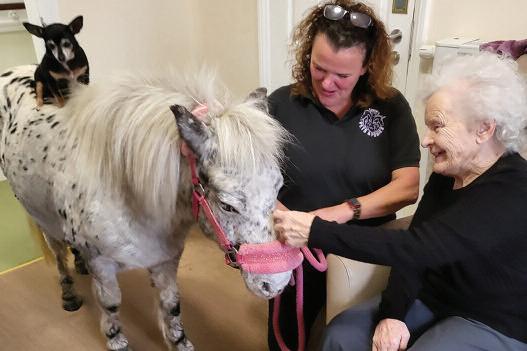
Pet therapy is a broad term that includes animal assisted therapy and other animal assisted activities Interacting with a friendly pet has been proven to help improve physical and mental wellbeing and even reduce
blood pressure Spending time relaxing with animals causes people to release endorphins, a hormone which produce a calming effect This can help alleviate pain reduce stress and improve overall psychological state
Kerry Coates Westerham Place home manager said:
“We had such a fun time welcoming Dotty and Pippy
The residents absolutely loved interacting with them and Pippy s antics had us all in stitches
“I’ve seen first hand the lift that animals give to residents and it was lovely to see the smiles on everyone s faces
A new survey of carers from across the UK provides a bleak apprais al of how many of the UK s seven million unpaid family carers have been fallen into financial misery by the cost of living crisis
The research undertaken by Carers Trust revealed that 41% of all unpaid carers have had to give up paid work altogether to provide the dedicated care at home that a sick or disabled relative needs A further 23% of respondents reported having reduced the number of paid hours they work because of their caring role
The survey revealed:
One in seven (14%) unpaid carers have had to use a food bank
Almost two thirds (63%) of unpaid carers are worried about being able to afford energy bills
Almost two thirds (64%) of unpaid carers have either had to give up work altogether or reduce their paid hours because of their caring role Carers Trust is urging the UK Government to provide additional cost of living support to unpaid carers now and to develop long term solu tion for funding of social care
A new survey of carers from across the UK provides a stark assess ment of how many of the UK s seven million unpaid family carers have been plunged even further into financial misery by the cost of living crisis
The research, undertaken by Carers Trust, the UK infrastructure charity for local care organisations revealed that 41% of all unpaid car ers have had to give up paid work altogether to provide the dedicated care at home that a sick or disabled relative needs A further 23% of respondents reported having reduced the number of paid hours they work because of their caring role
The research, which was responded to by 2,675 family carers, uncov ered the shocking fact that one in seven (14%) unpaid family carers are now using food banks as a result of soaring living costs In addition:
25% have had to cut back on food • 9% have either sold their home or released home equity to pay for essential items 14% have not been able to pay household bills on time • 39% have had to cut back on other household items
have had to use a credit card to pay for essential household items
have had to borrow money from a friend or a relative • 18% have had to take out a loan
One survey respondent said “I am terrified that I won’t be able to pay the bills this winter
Responding to a survey question about what essential costs they would no longer be able to afford over half (53%) said transport almost two thirds (63%) said energy bills and over one third (34%) said rent or mortgage costs CARER’S ALLOWANCE FAILING TO
The survey also starkly highlighted the inadequacy of Carer’s Allowance the principal state benefit for unpaid carers Currently set at £69 70 per week in England, this is the lowest level benefit of its kind despite more than one third (34%) of unpaid carers spending 50 hours or more a week caring for a sick or disabled relative Eligibility criteria for the benefit are strict: claimants must earn £132 a week or less after tax and must be spending a minimum of 35 hours a week caring for someone Over half of all survey respondents said that they do not receive the allowance and, of those who did, 47% of respon dents said it was not enough to meet their needs as an unpaid carer The survey also found that instead of preventing poverty among recip ients, Carer’s Allowance recipients were more likely to be experiencing financial hardship 59% of respondents receiving Carer’s Allowance said they were strug
gling to make ends meet compared to 47% of respondents who don t receive Carer s Allowance
20% of respondents receiving Carer’s Allowance said they had had to use a food bank as a result of their caring role compared to 8% of respondents who don t receive Carer s Allowance
A parallel survey of Carer’s Trust’s network of over 120 local carer organisations who provide services to unpaid carers has also high lighted the impact of recruitment challenges and funding shortages on their ability to support unpaid family carers 48% of services cited fundraising and sustainability as the principal challenge to work sup porting unpaid carers whilst 40% of respondents cited staff recruit ment and retention as a challenge almost twice the level (23%) reported the year before
Responding to the findings of the survey Carers Trust s CEO Kirsty McHugh said:
‘Our nation’s health and social care system relies on the hard work of millions of unpaid family carers However the double whammy of lack of financial support and struggling local services means that millions of unpaid family carers are being pushed into dire poverty
With little ability to work unpaid carers simply cannot boost their earnings to meet the cost of living crisis Yet they need to keep the heating on and equipment running to keep their sick and disabled rela tives warm and safe The recent Autumn Statement simply did not recognise the extra cost of being an unpaid carer We therefore need to raise Carer’s Allowance urgently and to add it to the list of benefits qualifying for the additional £900 cost of living support payment
‘We also need Government to make good on its long awaited prom ise to publish a proper strategy for unpaid carers As a country we’re relying on unpaid carers to keep the health and care system afloat The least we can do in return is ensure they get a fair deal in return
desperately needParkinson s UK has launched a major campaign demanding better training for social care staff as exhausted families say the needs of their loved ones with Parkinson s related dementia are being neglect ed
Over 1200 postcards signed by carers of people with Parkinson s related dementia, have been delivered to Whitehall as part of the char ity s Nobody Really Knows Us campaign
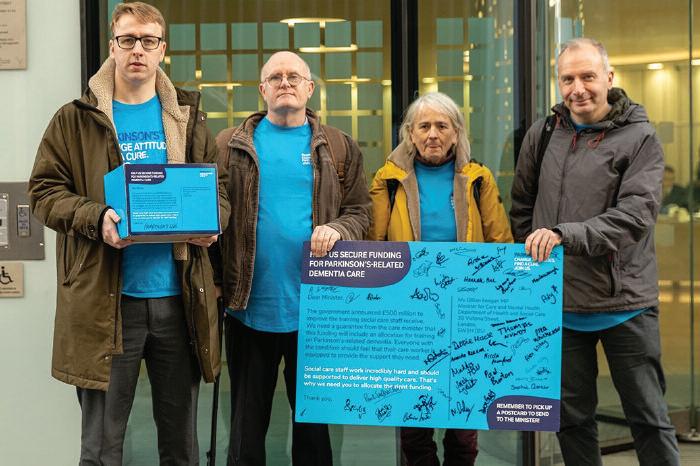
The campaign is calling for the Government to allocate some of the £500 million it has pledged to upskill the social care workforce to equip workers with the right skills to help people with the condition A 2021 study by Parkinson s UK showed that just 14% of health professionals felt that their training had prepared them well to provide high quality care for people with Parkinson’s related dementia A further 58% said their training was adequate but they needed more
The same study showed the impact of that lack of training with just a quarter of carers of people with Parkinson s related dementia feeling that social care staff understood their needs, while some were given no help at all
The postcards from family members were delivered to the Department of Health and Social Care and the charity hopes to meet the Care Minister Helen Whately soon to discuss their demands Families say they are under excessive pressure to both make sense of the health and care system themselves and understand their loved one s complex needs They say they are also under huge pressure as the social care system doesn t give them a break
Over 120 000 people in England are living with Parkinson’s which is the fastest growing neurodegenerative condition in the world There are over 40 symptoms associated with it, from tremor and pain to anxi ety
Around three in ten people with Parkinson’s have Parkinson’s related dementia and it typically slows down a person s speed of thinking and creates problems with hallucinations, understanding, planning, judge ment language and memory They live with both movement and cog nitive symptoms, unlike most other types of dementia
Barbara Deering 76 from Buckinghamshire signed her postcard after years of caring for her husband Barney without any support including when she was having chemotherapy for Lymphoma She says it took a major incident when her husband fell from the top of the
She said “My lovely
“After about ten years, his mental health deteriorated and he became physically weaker and began losing his eyesight Not through lack of trying we fell through loopholes in the system and failed to get a proper diagnosis of dementia long term help advice or support
“I became his carer 24/7 and he needed my constant attention Medication feeding bathing dressing and toileting take a lot of the day In addition hallucinations non cooperative behaviours and night terrors are a massive challenge when there is no advice available
I became totally exhausted getting up at least 10 times a night socially isolated and at my wits’ end Our two children and their families tried to help wherever possible but were working full time with chil dren at school and didn’t live locally
This situation became further complicated when I became seriously ill and had an extensive course of chemotherapy Because I couldn’t afford a carer he had to come with me He was refused hospital trans port with me so I had to pay for taxis to get there
When Barney went into care via Social Services following his fall he was placed in a home over an hour s drive away and deteriorated so much He was in hospital for 3 months where I visited every single day to help feed him It was costing me up to £200 pounds a week in petrol and parking
Fortunately I found him a wonderful nursing home after visiting 22 where he spent his last years ”
Barney who had a career in management and volunteered for Parkinson s UK died aged 78 of Lewy Body Dementia The couple had been married 54 years
Parkinson’s UK conducted interviews with people with Parkinson’s related dementia and their carers as well as surveys of carers and healthcare professionals to fully understand their experience of health and care services
It revealed that training for health and care professionals on Parkinson s related dementia is inadequate and inconsistent and peo ple affected by the condition feel that “nobody really knows us”
Sam Freeman Carney, Health Policy and Improvement Lead at Parkinson s UK said: Our report found the health and care needs of people with Parkinson s related dementia and their family and friends are being severely neglected Unfortunately even from the very start of their journey, the health and social care system is ill equipped to support people with these types of dementia
There is a major problem with the lack of understanding of Parkinson’s related dementia among paid carers in the home or in care homes We also see this in health care professionals who do not spe cialise or have a special interest in the condition
“This is putting incredible pressure on families who as well as trying to navigate a complex care system, are also faced with care staff who lack training for this specific condition Families are crying out for urgent support We re demanding action now
The charity is calling for the Department of Health and Social Care to allocate some of the £500 million they announced earlier this year to upskill hard working social care staff on Parkinsons related dementia to drive up the quality of care the community receives
Visit the Parkinson’s UK site to find out more about Parkinson’s relat ed dementia and the Nobody Really Knows Us campaign
this week
As demand for the NHS and social care workforce continues to grow over the next decade, maximising digital technologies will allow for the transformation of work force planning and supply education and training clinical decision making and deliver personalised healthcare services
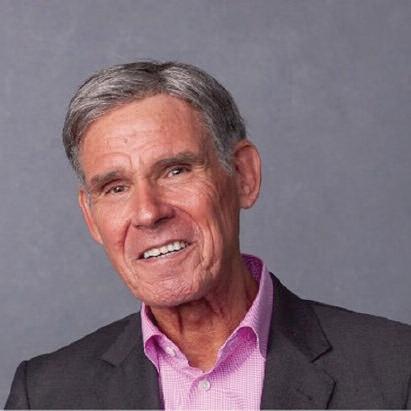
Expanding on the legacy of the Topol Review chaired by digital leader cardiolo gist and geneticist Professor Eric Topol this report delves deeper into ensuring that the health and care workforce is digitally ready for the future
It examines how digital technology is being used to develop a continuous learning environment, enabling new ways of working and highlights how improved technolo gy can help health and care services to be organised and delivered more efficiently Enhancing the use of digital technology also means the NHS and partners can
“This
A great deal has been achieved in a relatively short period of time and shows the immense benefits the use of digital technologies have in health and care servic es
Read the full report at https://www hee nhs uk/our work/innovation digital transformation/harnessing digital technologies workforce development educa tion training overview
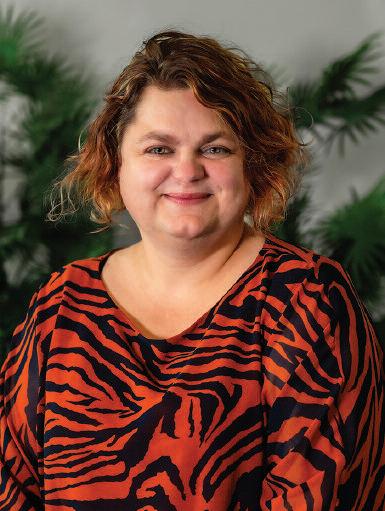
Meallmore Ltd
In her new position Rachel will build on the company’s people and culture strategy with a particular emphasis on employee experience for all 1 700 members of staff who work in Meallmore s 26 care homes around Scotland
Rachel will work closely with Meallmore s recruitment team and learning and development team to continue to attract and retain the best employees This will be through identifying staff training implementing company incentives, and attracting the best talent in the industry to ensure that Meallmore continues to have the best workforce who provide the highest quality care for residents across Scotland
Rachel joins Meallmore from Baxters Food Group where she was Head of HR for Europe, leading the HR team to deliver high quality people routines covering five manufacturing sites across Europe and their head office Rachel also spent 22 years at Tesco
she was Group People Manager in the Highlands and Islands of Scotland There
she was responsible for the people agenda for over 4 000 colleagues and she successfully led the team to deliver several structure change projects throughout the business
Speaking about her appointment Rachel said Meallmore has such a great reputation for providing exceptional care and that s what initially attracted me to this role The company has such a supportive envi ronment and brilliant family values which they really stick to Since starting my new position everyone has been so welcoming and I m very glad to be part of the Meallmore family
“At Meallmore we pride ourselves on our excellent standards I look forward to supporting team mem bers in all departments from caring and hospitality to management and support colleagues in their efforts to further develop the company’s aim of being a great place to live and a great place to work ”
Cillian Hennessey Meallmore’s Commercial Director added: “We’re so glad to have Rachel on board at Meallmore She’s sure to build on all that our company has achieved over its past 35 years to move forward our people agenda
“We’ve always been committed to leading, supporting and improving our workforce and that s why we were thrilled to achieve the prestigious Investors in People (IIP) Gold Accreditation in autumn 2021, demon strating our commitment to our colleagues In this industry, our people are crucial to what we do, and we are committed to making sure they get the best experience working with us, which also results in us getting the best out of them With Rachel’s new role, she will build on this and beyond We’re really excited to see what the future holds for all our staff across our care homes ”
Leading Scottish care provider has appointed Rachel Gothard to the newly created role of People & Culture DirectorA new survey of carers from across the UK provides a bleak apprais al of how many of the UK’s seven million unpaid family carers have been fallen into financial misery by the cost of living crisis
The research, undertaken by Carers Trust, revealed that 41% of all unpaid carers have had to give up paid work altogether to provide the dedicated care at home that a sick or disabled relative needs A further 23% of respondents reported having reduced the number of paid hours they work because of their caring role
The survey revealed:
• One in seven (14%) unpaid carers have had to use a food bank
Almost two thirds (63%) of unpaid carers are worried about being able to afford energy bills
Almost two thirds (64%) of unpaid carers have either had to give up work altogether or reduce their paid hours because of their caring role Carers Trust is urging the UK Government to provide additional cost of living support to unpaid carers now and to develop long term solu tion for funding of social care
A new survey of carers from across the UK provides a stark assess ment of how many of the UK s seven million unpaid family carers have been plunged even further into financial misery by the cost of living crisis
The research undertaken by Carers Trust the UK infrastructure char ity for local care organisations revealed that 41% of all unpaid carers have had to give up paid work altogether to provide the dedicated care at home that a sick or disabled relative needs A further 23% of respon dents reported having reduced the number of paid hours they work because of their caring role
The research which was responded to by 2 675 family carers uncov ered the shocking fact that one in seven (14%) unpaid family carers are now using food banks as a result of soaring living costs In addition:
25% have had to cut back on food
• 9% have either sold their home or released home equity to pay for essential items
• 14% have not been able to pay household bills on time 39% have had to cut back on other household items
29% have had to use a credit card to pay for essential household items 26% have had to borrow money from a friend or a relative 18% have had to take out a loan
One survey respondent said “I am terrified that I won’t be able to pay the bills this winter
Responding to a survey question about what essential costs they would no longer be able to afford over half (53%) said transport almost two thirds (63%) said energy bills and over one third (34%) said rent or mortgage costs CARER’S ALLOWANCE
The survey also starkly highlighted the inadequacy of Carer’s Allowance the principal state benefit for unpaid carers Currently set at £69 70 per week in England, this is the lowest level benefit of its kind, despite more than one third (34%) of unpaid carers spending 50 hours or more a week caring for a sick or disabled relative Eligibility criteria for the benefit are strict: claimants must earn £132 a week or less after tax and must be spending a minimum of 35 hours a week caring for someone Over half of all survey respondents said that they do not receive the allowance and of those who did 47% of respondents said it was not enough to meet their needs as an unpaid carer The survey also found that instead of preventing poverty among recipients Carer s Allowance recipients were more likely to be experiencing financial hardship
• 59% of respondents receiving Carer’s Allowance said they were strug
gling to make ends meet compared to 47% of respondents who don t receive Carer’s Allowance
20% of respondents receiving Carer s Allowance said they had had to use a food bank as a result of their caring role, compared to 8% of respondents who don t receive Carer s Allowance
A parallel survey of Carer’s Trust s network of over 120 local carer organisations who provide services to unpaid carers has also high lighted the impact of recruitment challenges and funding shortages on their ability to support unpaid family carers 48% of services cited fundraising and sustainability as the principal challenge to work sup porting unpaid carers whilst 40% of respondents cited staff recruitment and retention as a challenge almost twice the level (23%) reported the year before
Responding to the findings of the survey Carers Trust’s CEO Kirsty McHugh said
Our nation’s health and social care system relies on the hard work of millions of unpaid family carers However the double whammy of lack of financial support and struggling local services means that millions of unpaid family carers are being pushed into dire poverty
With little ability to work unpaid carers simply cannot boost their earnings to meet the cost of living crisis Yet they need to keep the heating on and equipment running to keep their sick and disabled rela tives warm and safe The recent Autumn Statement simply did not recognise the extra cost of being an unpaid carer We therefore need to raise Carer s Allowance urgently and to add it to the list of benefits qualifying for the additional £900 cost of living support payment
We also need Government to make good on its long awaited prom ise to publish a proper strategy for unpaid carers As a country we’re relying on unpaid carers to keep the health and care system afloat The least we can do in return is ensure they get a fair deal in return’
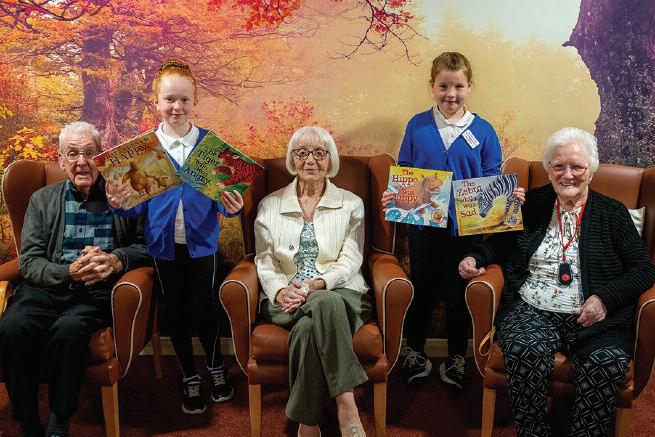
Astune Rise care home in Eston welcomed children from Whale Hill primary school as part of the nationwide Silver Stories project
Every week youngsters from the nearby school will take it in turn reading to residents and chatting and exchanging stories
The nine year olds Rosajean and Penny read The Zebra who was Sad The Hippo who was Happy and The Tiger who was Angry to resi dents Betty Tom and another Betty The more than hour long visit also brought lots of laughter to the group with the children feeling particu larly important with their specially made staff name badges
Silver Stories is a charity based in Cornwall that encourages inter generational relationships by encouraging children to read stories over the phone to residents in care homes Astune Rise s manager Caroline Bowstead was delighted that the pupils visited the home in person to allow them much more personal interaction with the residents
The project aims to build strong bonds between care home resi dents and children and build the youngsters reading skills and confi dence

A joint venture (‘JV’) between Allegra Care, a UK focused care home operator and Moorfield Group a UK specialist real estate fund manager acting on behalf of Moorfield Real Estate Fund V (Moorfield), has com pleted the acquisition of four nursing dementia and care homes in Bristol and South Gloucestershire
The JV acquired the homes from Grove Care a family run care home business for an undisclosed sum The acquisition supported by Virgin Money as debt provider adds a further 183 beds to the partnership s rap idly growing nursing dementia and care homes portfolio
Olive Tree House, a 65 bed home, and Rose Garden, a 40 bed home, are co located in Patchway The two properties are modern fit for pur pose homes where 100% of the beds have accessible wet room ensuites each allowing for the implementation of Allegra Care’s bespoke ‘house hold care model
Blossom Fields, a 43 bed home with 100% of the beds having accessible wet room ensuites, is located in Winterbourne and is co located with The Grove a 35 bed home specialising in residential dementia care Both The Grove and Blossom Fields are rated “Outstanding” by the Care Quality Commission The four homes provide a range of care services tailored to residents needs with options for specialist dementia and nursing care and 24 hour assisted living for Olive Tree House, Rose Garden and Blossom
Caroline Bowstead manager at Astune Rise care home said
Both Bettys and Albert were elated with the visit from the children They stayed for more than an hour, and all had a great time
Seeing everyone involved enjoying the experience and knowing that we’re helping to build a stronger community is very rewarding The resi dents can t wait for the next visit
“Thank you to Whale Hill School for the opportunity and to the chil dren for reading so entertainingly ”
Katherine Laverick lead pastoral care and wellbeing at Whale Hill School in Eston said:
We think that this is such a fantastic opportunity to build the chil dren’s confidence with reading and to have a unique experience when it comes to education
“They all thoroughly enjoyed visiting Astune Rise and are excited for their next visit
The children were thrilled with the whole visit John even asked one of our teachers to look after his name badge so he wouldn’t lose it!”
Fields The Grove specialises in dementia care
The homes also offer residents a range of community facilities and wellbeing focused amenities, including spacious lounges and purpose built gardens
Helen Jones Chief Executive Officer of Allegra commented
“We are very pleased to confirm the addition of Olive Tree House Rose Garden The Grove and Blossom Fields to our growing family of homes The homes are well established, well regarded, attractive, and warm with strong standards of service We welcome our new col leagues to the Allegra Care team We thank our due diligence partners for their efforts The acquisition heralds a tremendous end to 2022 for Allegra Care ”
Charles Ferguson Davie Chief Investment Officer of Moorfield com mented:
“The UK nursing, dementia and care home market is marked by fragmented ownership and a severe
imbalance in the face of an ageing population
demonstrated by today s announcement, we see a major opportunity to create a market leading port
vision
in
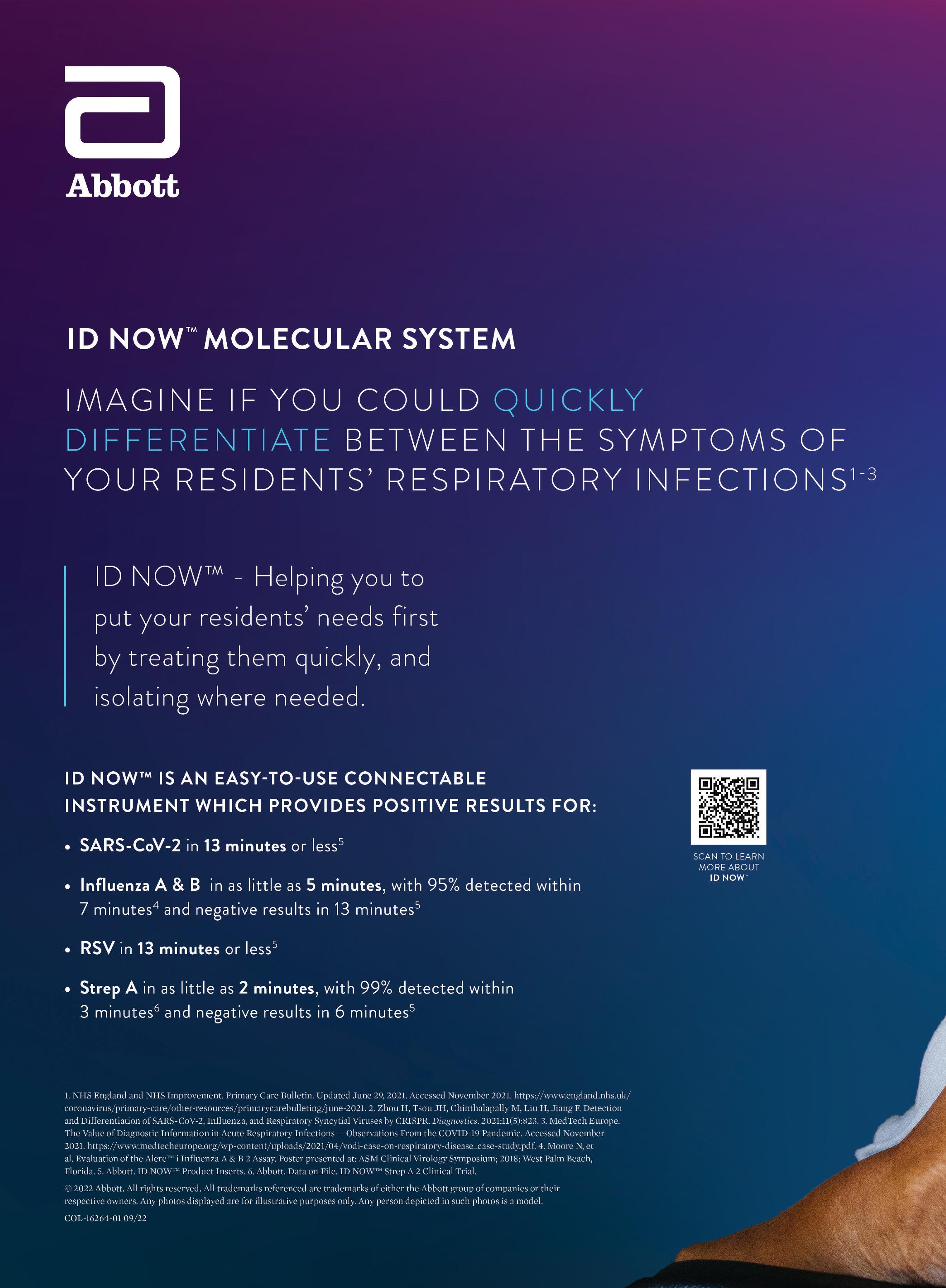
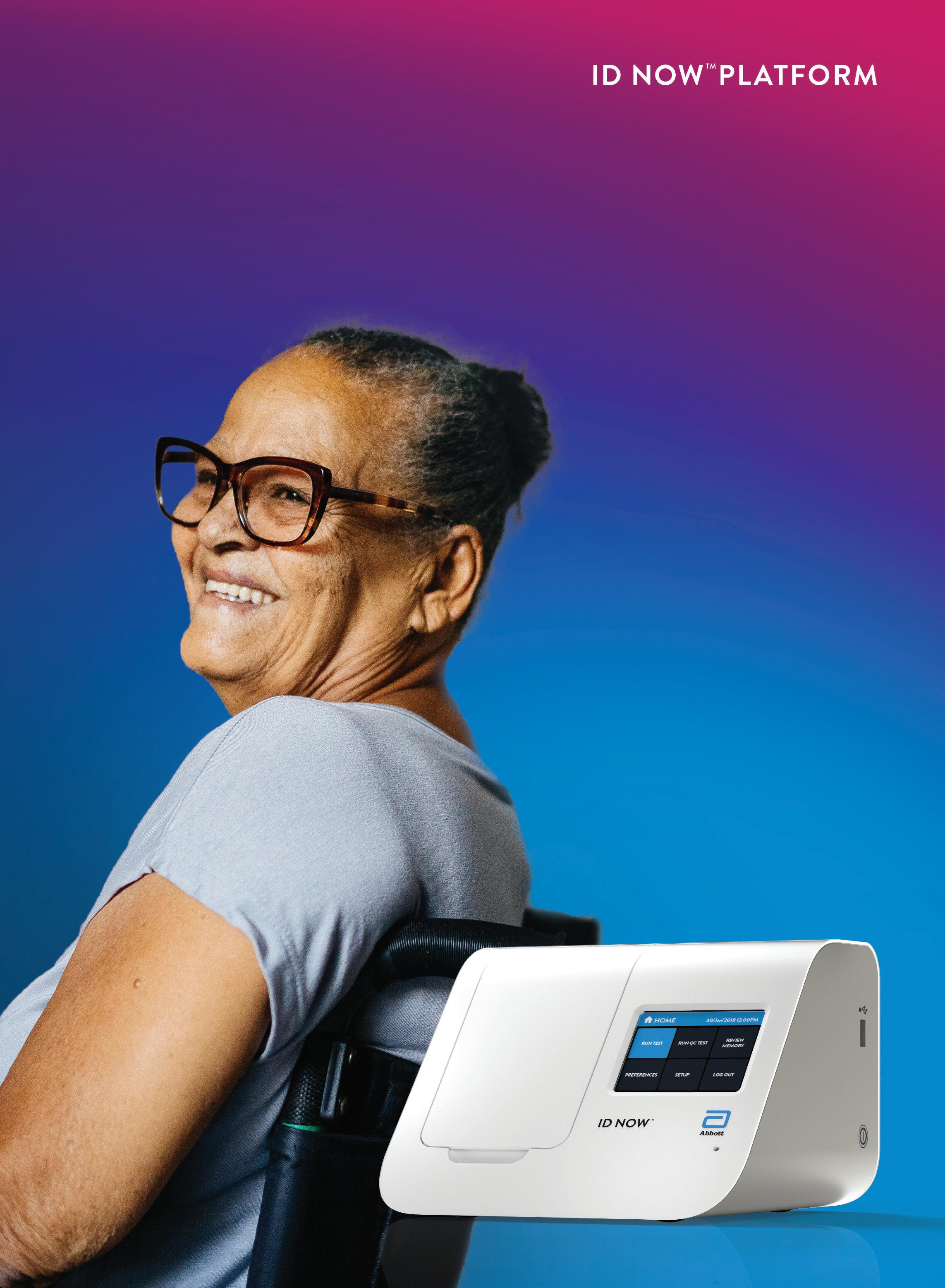

Alongside
• ACUTE AND GENERAL WARDS
GOJO provides a straight ‘out of the box’ solution for hand hygiene, incorporating dis pensers products accessories and signage as well as training and on boarding support It also manages installations thereby reduc

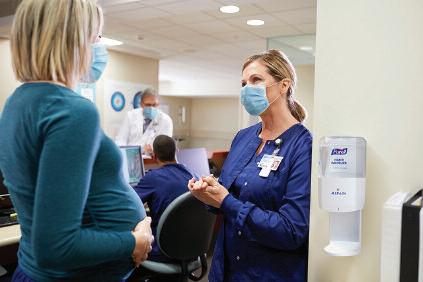 By
By
ing the staffing impact of changing suppli ers
• COMMUNITY & SOCIAL SERVICES:
These environments often have radically different needs from what are traditionally catered for in healthcare packages GOJO takes these specificities into consideration and offers specially adapted products for example locked dispenser units and foam sanitiser so they can only be opened by trained personnel in demanding environ ments
Its train the trainer programme
hygiene compliance is to ensure that the right products are available in the right places at the right time We are constantly innovating to keep people and places healthy This means formulating products that are not only effective at killing germs but that won’t irritate hands that must be repeatedly cleaned throughout a shift
Ensuring that the products are available when and where they are needed be that personal bottles of hygienic hand rub or dispensers positioned in optimal locations And last but not least developing solutions with the environment in mind
“For example from 2023 we plan to move to RPT refills; all collapsible refills will be made from recycled materials as well as being recyclable ”
‘Widely used in the NHS, PURELL® is a trusted brand in healthcare facilities around the world Our solutions encompass fast active effective formulas that care for skin state of the art dispensers, and specialist support such as the Royal College of Nursing (RCN) accredited training making us the ideal healthcare partner
For a tailored effective, total solution for your setting or for more information on the benefits of partnering with GOJO please call +44 (0)1908 588444 email

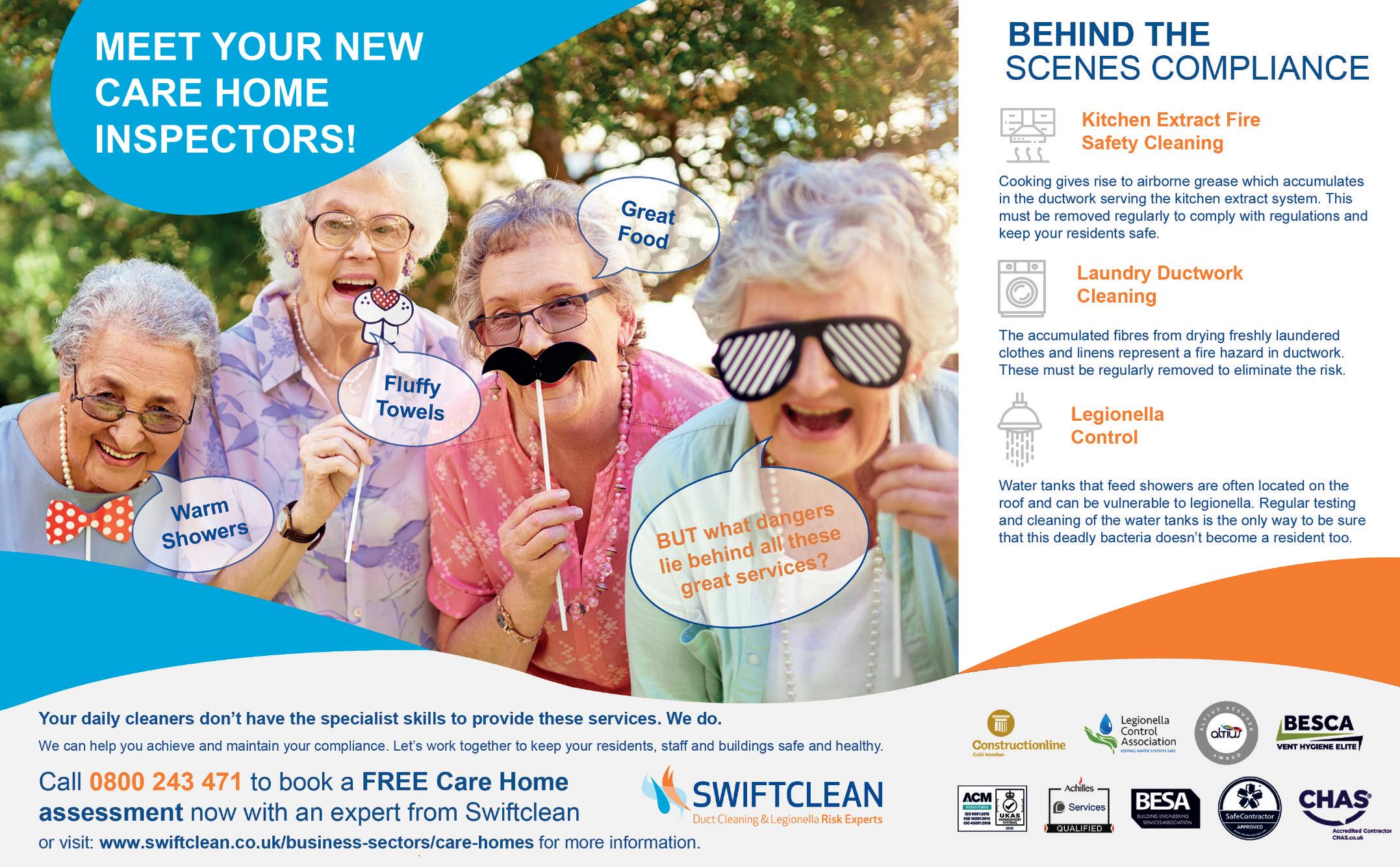



As
At
Current research shows that 20% of care home resi
Therefore,
At It’s Made For You, we believe that everyone should look forward to tasty safe and nutritious texture modified meals The It s Made For You range is designed for the International Dysphagia Diet Standardisation Initiative (IDDSI) framework standards and includes valuable nutrition It s Made For You are proud to be Gold Sponsors of IDDSI
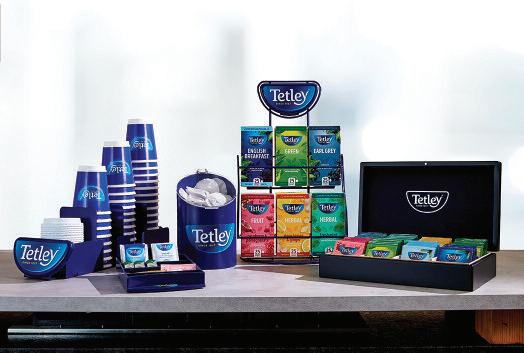
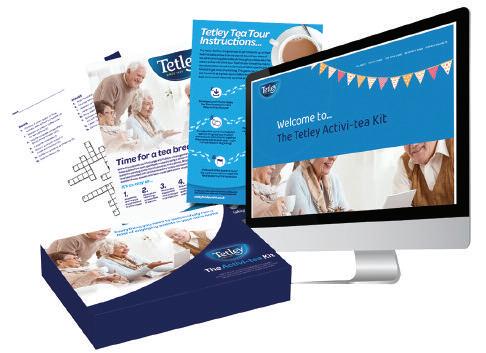
Our range of meals have been developed to ensure the nutritional content will meet the nutritional


The autumn and winter months are a busy time for anyone in the care sector and it is important that all residents have a chance to enjoy warming nutritious food at every mealtime

Mary Wedge Business Development Manager at Anglia Crown com ments: “In our experience many of the residents look forward to the desserts They often represent familiar comfort foods and, even if they can not face the main course will often go straight for the pudding

Anglia Crown offer a wide range of hot and cold desserts that are ideal for a well balanced nutritional diet including choices that do not contain gluten Our Crown Choice and Advantage ranges include some fifty eight dishes, including our new, autumnal warming Ginger Chocolate Chip Sponge and delicious comforting custard that goes with almost any hot dessert

Our Crown Choice cold dessert includes the perennial favourites such as Chocolate Cake whilst our Crown Advantage range also offer reduced sugar desserts All individual Crown Advantage desserts come in packs of eighteen whilst the Crown Choice desserts come in packs of 3 and 6 allow ing accurate portioning and cutting down on any potential waste
Many of the Anglia Crown dishes can be teamed up with fresh fruit allow
ing for additional choice Items such as our Carrot Cake or Vanilla Cheesecake can be accompanied by whipped cream garnished with sea sonal fresh fruit


Our hot desserts are high in energy our hot portions of 170kcal and above provide energy and protein dense options and when served with custard provide over 250 kcal per serving Our cold desserts of 250 kcal and above also meet the energy guidelines in the British Dietetic Association (BDA) Nutrition and Hydration Digest (2017) requirements
VEGAN SUITABLE CHOICES
At Anglia Crown we pride ourselves with the array of vegetarian and gluten free dishes that we offer including an impressive range of desserts This was recognised with us being named at the Vegetarian Wholesaler of the Year 2022 at the VfL Awards for Excellence in Veg n Care Catering
All the Anglia Crown hot desserts are suitable for vegetarians Most of the Anglia Crown vegan products have been registered with the Vegan Society, including some thirteen of the dessert dishes ” Anglia Crown are here to help take the strain out of your menus throughout the year Visit www angliacrown co uk for further details


bination of natural ingredients including ethanol men thol eucalyptus peppermint and MSM Reported ben efits of BIOFROST® Relief include lasting pain relief, improved joint movements comfort during sleep fewer cramps calmed nerve pain reduced joint and muscle discomfort and faster post activity recoveries

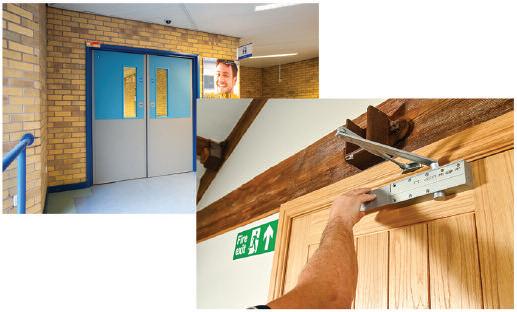
BIOFROST® Cold Therapy Gels are natural drug free topical cold therapy gels for muscular and joint pain chronic arthritic pain, post activity muscle ten sion general aches and overuse disorders Easy to use and fast acting, BIOFROST® Cold Therapy Gels relieve pain reduce inflammation and swelling without drugs and drug related side effects
Gels:
BIOFROST® Active is a dual action fast acting cold gel with heat sensation for effective relief of muscular and joint pain Containing 10 natural herbal extracts (i e Arnica Burdock Roman Chamomile Garlic Watercress Ivy White Nettle Pine Rosemary Menthol) BIOFROST® Active relieves chronic pain releases muscular tension loosens stiff joints and effectively treats back pain Benefits of BIOFROST® Active include easier joint movements, effective pain relief in treated areas discomfort free sleep fewer cramps and reduced post activity muscular and joint fatigue
BIOFROST® Cold Therapy Gels are usable stand alone or alongside other pain relieving therapies (i e medication, physiotherapy, etc ) BIOFROST® Cold Therapy Gels are suitable for people of any age including elderly and disabled people living independ ently or in nursing care

BIOFROST®
Fire Doors are an imperative part of fire safety and are consider ations of the design and maintenance of any building but especially residential Article 17 RRFSO states fire safety provisions (includes fire doors) must be main tained in a suitable condition order
If you are the Responsible Person it s imperative you appoint a competent person to assist in meeting your duties under the fire safety order to ensure fire safety measures including fire doors are kept in working order
Yeoman Shield’s Fire Door Services can help to take the guess work out of fire door maintenance by providing fire door inspections condition reports remedial work and fire door installation all carried out by FDIS and/or FIRAS accredited team members Having a good maintenance routine will dispel some needs of fire door replacement therefore being more cost effective
ation of Yeoman Shield Fire ction products can also be in the long term finan cially beneficial by halt ing impact damage from the start eliminating many repairs in the future and again will extend door lifecycles Installing Yeoman Shield door protection products such as door protection panels door edge protectors and PVCu glazing bead units will not affect the integrity of the fire door as all products have been tested in situ to the current standard required
Vulnerable frames and architraves can also be protected from impact with Yeoman Shield to pre vent dangerous splintering and splitting as well as abolishing the time consuming, repetitive need for repainting
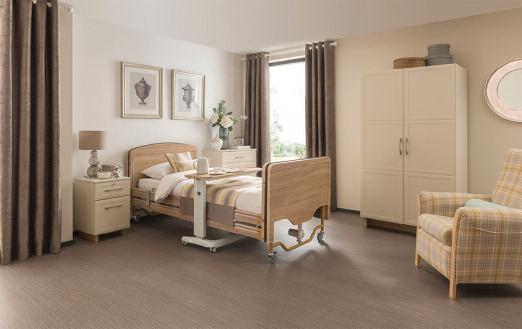
For a complete repair and protect service contact the team today frdp@yeomanshield com or visit www yeomanshield com or see the advert page 10
Care facilities typically exhibit significant but var ied hot water and heating usage patterns which con tributes to the current 40% tally of UK greenhouse gas emissions generated by the built environment
To help achieve climate neutral building stock by 2050 the industry is being challenged to reduce oper ational energy use over all other measures By increasing the use of renewable energy supply and prioritising on site renewable energy sources the hope it to reduce both carbon and bills

Sustainability comes with a cost Whether in the form of new build projects or and far more likely the refurbishment of existing yet ageing facilities under standing the necessary capital investment opera tional savings and payback periods is going to be key
Addressing the efficiency of domestic hot water (DHW) systems whether through the implementa

tion of heat pumps solar thermal direct electric water heating or even simple modernisation of exist ing gas appliances helps care facilities meet sus tainability goals in a practical and cost effective manner It also delivers improved year round condi tions for staff and clients in care providing access to spaces better suited to delivering medical care and assisted living
For buildings already on gas and that rely on large amounts of DHW a large proportion of current UK care and nursing home properties solar preheat is the preferable option For new build properties the expectation is for specification to default to a mixture of heat pumps and direct electric afterheat New sys tem approaches including prefabricated packaged plant rooms also provide for better use of the spaces that already exist without the need to undertake expensive and disruptive building projects This is especially valid as demands for beds continue to increase placing new demands on care facilities
Adveco can help achieve emission reduction tar gets With more than 50 years of specialised expert ise in designing, supplying, and servicing hot water systems to the nursing and care industry, Adveco is the single resource you need for independent expert technical guidance on choosing and developing bespoke sustainable applications today to get you on the right path towards net zero operation
Visit https://adveco co/sectors/healthcare/ or see the advert on page 15

Facing unprecedented energy costs and an increasingly pressing climate cri sis care home operators are all aiming to minimise energy consumption According to the Carbon Trust the care sector spends over £400 million on energy each year and after heating and lighting it is irrefutable that appliances are a main contributor to this figure For any care home, laundry is a key service area and one that is absolutely critical to maintaining infection control Thankfully, whereas you can’t turn down the heating in a care environment, or turn off the lighting there are ways in which you can significantly reduce the energy consumed by your laundry function Forbes Professional helps care home operators source the most energy water and user efficient laundry solu tions whilst advising on all relevant WRAS and industry requirements When choosing dryers, it is notable that care homes are increasingly turning away from gas appliances due to increasing running costs and safety concerns This is all the more notable now that changes to industry requirements are necessitating considerable investment in order for gas appliances to meet the current standards Forbes would generally recommend that electrical appliances should be the product of choice with heat pump dryers enabling astounding cost and energy savings Miele’s new heat pump commercial dryers are particu larly highly rated for their safety functionality and energy efficiency They employ a highly efficient and eco nomical filter system and heat exchanger to keep run times low and enable an energy saving of up to 60% when compared to vented dryers Additionally these heat pump dryers do not require any make up air
which enables the laundry function to be installed in the basement or in a cen tral location within the care home and saves on costly vent ducting Due to the effective interaction of the Miele filter system and the maintenance free heat exchanger fluff cannot clog the heat exchanger or adversely affect the excep tional drying efficiency
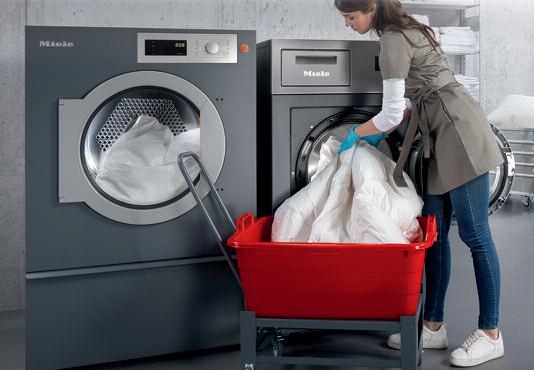
With regards to washing machines only a commercial washing machine will suffice in a care environment as only these machines will meet the WRAS requirements for Fluid Category 5 Forbes recommends using Miele commer cial washing machines as they are highly energy and water efficient whilst delivering both thermal and sluice disinfection As an illustrative example based on an electricity cost of £0 34/kWh and three machines being used four times/ day for five years, Miele machines can realise a running cost saving of £9 529 when compared to another industry brand
Auto dosing equipment also provides a great solution for ensuring that the right amount of detergent is dispensed for each cycle; minimising waste optimising the wash cycle and sav ing both money and time Forbes Professional provides a range of options for commercial laundry equipment including auto dosing equipment as well as Miele commercial laundry machines All of their products are available on a purchase rental or lease basis, with access to a comprehensive service that includes installation, commissioning, user training and a multi award winning repair and maintenance response
linkedin instagram



combat counterfeiting and grey market activity
Our industry leading eCommerce system is designed to reduce cost improve effi ciency and streamline supply chain management and will fully protect the integrity and accuracy of critical business data The order entry process is very simple meaning suppliers and vendors can spend their valuable time on tasks other than ordering apparel labelling
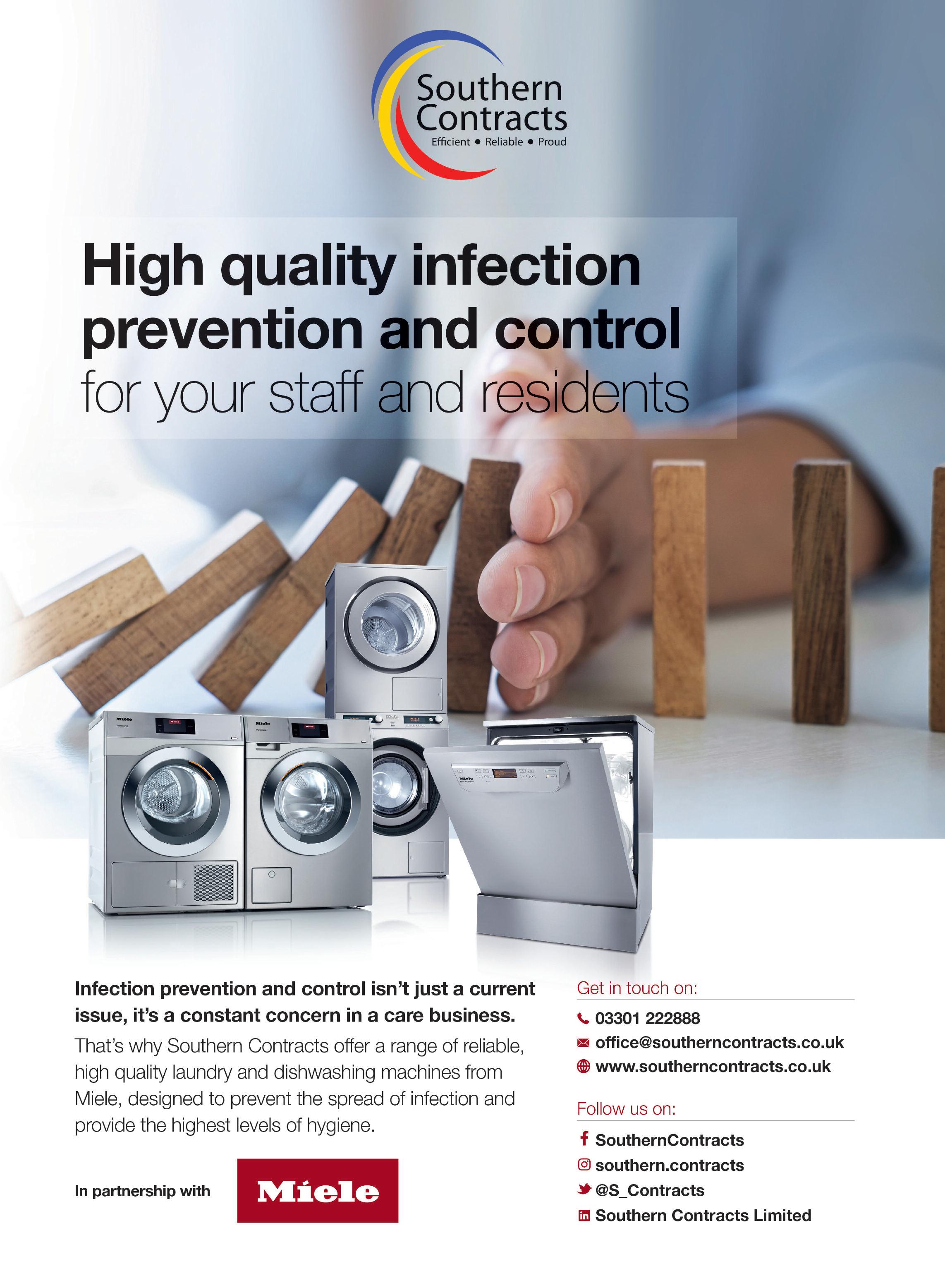



Care technologies have advanced at an amazing rate over the past decade The digital age is a place where we all live and all use tech nology as a familiar part of our daily lives At Medpage we have har nessed these advancing technolo gies into products to support Social Care and Independent Living Medpage brand products are designed to provide affordable user friendly care support products for domestic and professional care Our new wristband activated door egress alarm is a perfect example of how advanced technologies are transformed into a system to safe guard people prone to wandering Simple to install suitable for single or multiple residents the system allows residents to remain mobile while providing an alert to carers if they attempt to leave the building through a monitored door Further details available at www easylinkuk co uk search Doorwatcher
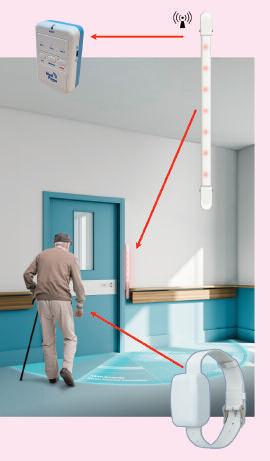
Medpage have supplied Care, Residential Homes, and Hospitals with fall prevention and detection alarms for more than 25 years From basic bed and chair exit detection alarms to more complex cordless sensor pad systems with nurse call integration, we supply quality sys tems that deliver cost effective per formance
Our new sensor pad controller the MPCSA11 has been included into numerous falls management proj ects in Hospitals and professional care establishments The system already proven to reduce care costs allows a patient with mobility to transfer from their bed to their chair or to visit their washroom without alarm notifications to carers providing the transfer is completed within a selectable time Failure to return within the selected time will result in alarm notification to carers either by pager nurse call trigger or ward wall mounted alarm receiver
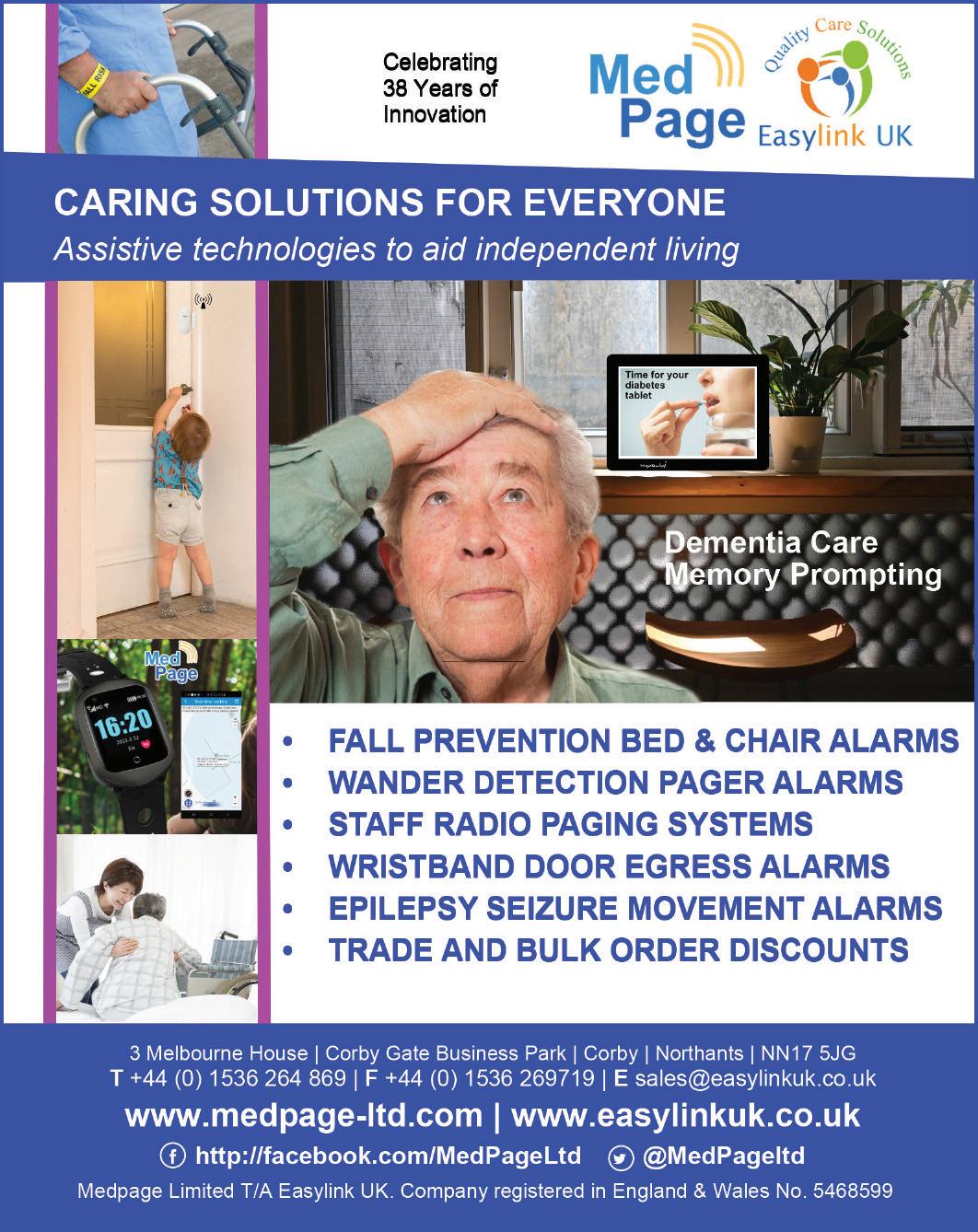
Quiet and calm care homes ensure that resi dents are able to live in a more relaxing and pleasant home environment Similarly carers and staff find that they too benefit from reduced stress when working in a home where noise levels are kept to a minimum There are many environmental factors that can affect those sensitive to their surround ings particularly those suffering from dementia these can be fluctua tions in ambient temperature light and of course noise Repetitive and high levels of noise can originate from a number of internal and exter nal sources for example telephones ringing loud conversations in cor ridors and call bells sounding, often one of the largest contributors to increasing the levels of stress and discomfort in residents
A published study by the University of Stirling stated that unan swered Nurse Call (Call Bell) alarms can be one of the most common causes of stress in dementia sufferers The University recommends “fit ting call alarms which alert nurses but do not resonate throughout the whole building Alarms can be particularly disconcerting as they may encourage the person with dementia to respond or investigate what the matter is At the very least the loss of sleep will compromise a per
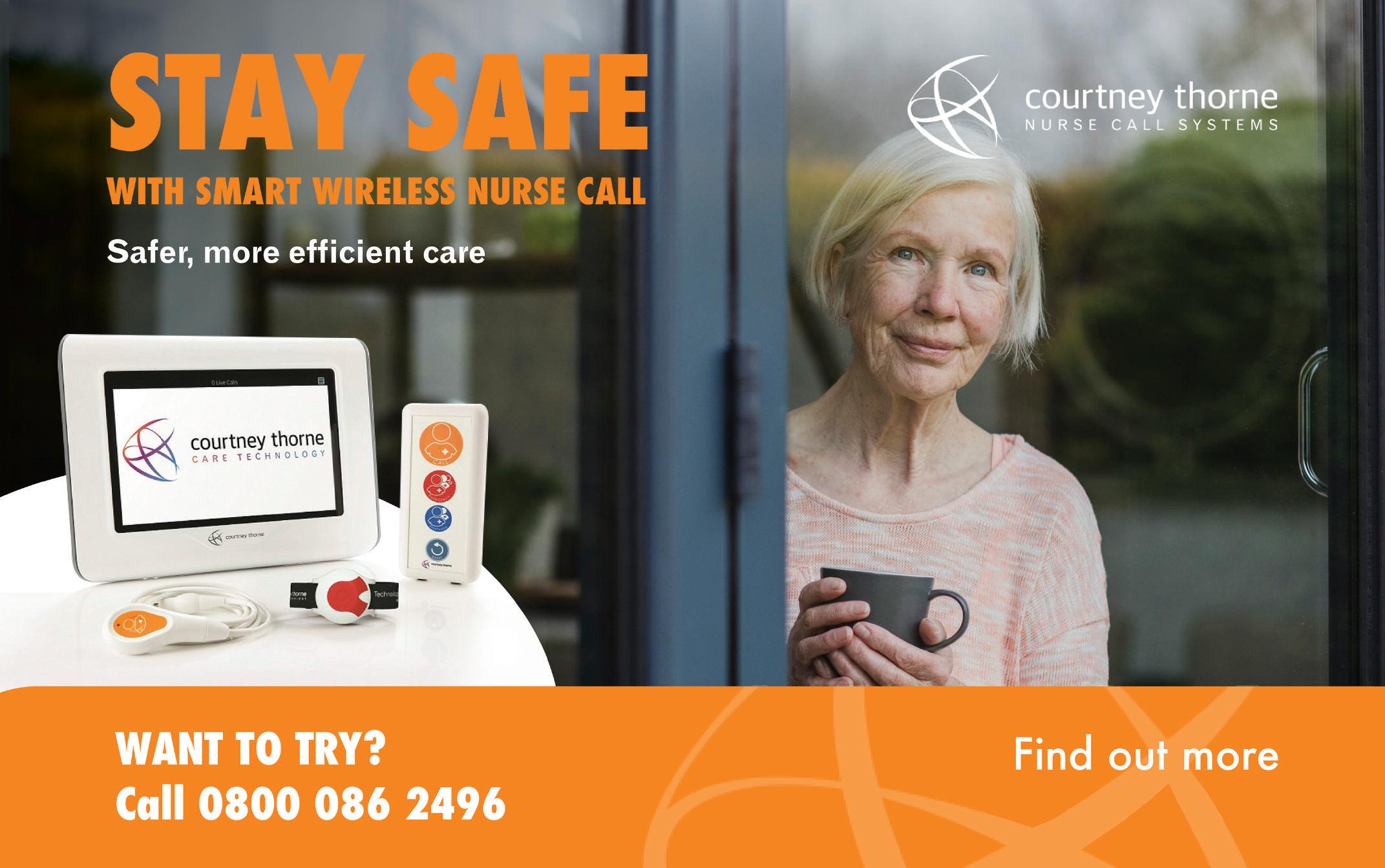
son’s ability to concentrate It can affect their attention levels and capacity to cope as well as being detrimental to their overall state of wellbeing Personal paging systems are preferable to bells and buzzers Modern Nurse Call systems can incorporate a number of methods to reduce their impact in a care home These include zoning whereby there are separate alarm types used depending upon the location of the call In these circumstances dementia suffer ers and those vulnerable to noise can be located in one zone whist less vulnerable residents live in an alternative “zone” Each “zone” can operate different call tones warning lights or other methods to alert when help is required
Reducing noise levels is essential to create a tranquil envi ronment for residents Pagers have been around for many years are a relatively simple and cost effective measure in reducing the levels of noise, and can be added to most Nurse Call systems Smart Mobile Devices are now becoming more commonplace for care home staff and hold a variety of apps for care planning e medication etc Many Courtney Thorne clients are now utilising the “Go” app with their Nurse Call sys tem With the “Go” app nurse call alarms are delivered imme diately and silently straight to the handsets alerting the individual carers to all Nurse call alarms without creating any general alarm sound and rarely disturbing the rest of the resi dents in the home
Calmer residents ultimately means that staff are less
stressed also this creates a happier workplace
is greatly improved staff are retained and CQC
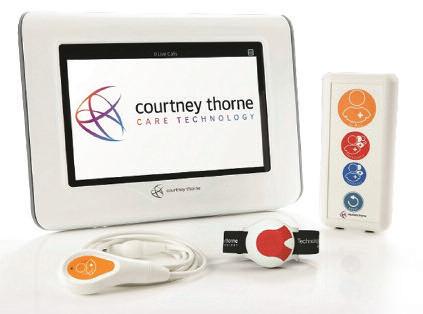

www.nursecallsystems.co.uk
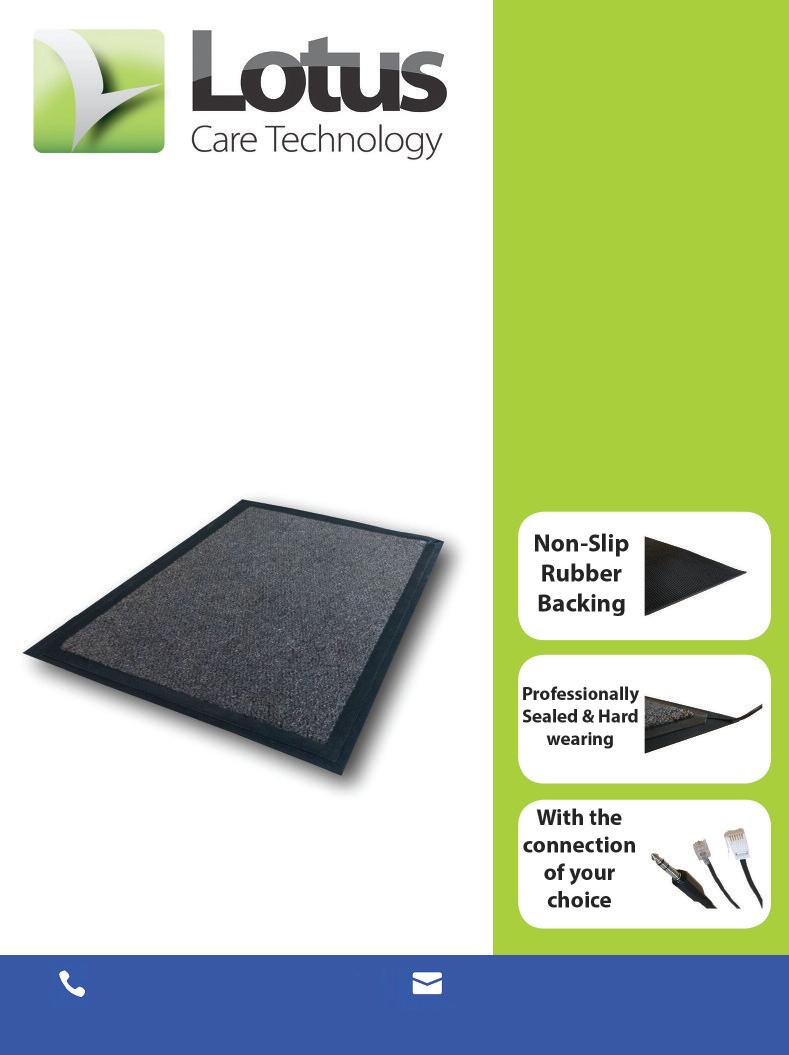

The UK is embracing a new era of data driven social care reform Digitisation and datafication are enabling enhanced visibility, unlocking a new paradigm of proactive person centred care How is data enabling this transformation what are the stumbling blocks and what strategies are necessary to create a new digital roadmap that leads to better outcomes?
Stuart Barclay, uK sales director of fall detection and remote monitoring supplier Vayyar Care recently chaired a live roundtable discussion with key players in the social care sector to explore the power and potential of technology enabled care


Four of the field’s leading providers and thought leaders explored the key factors driv ing change in social care The conversation brought together Alyson Scurfield, CEo at TSA, paul Berney, Cmo at Anthropos, Claire Aldridge, Strategic Contract manager at millbrook Healthcare Group and Tim Barclay CEo at Appello to share their visions for the future and how they are leverag ing data to truly transform care
STUART BARCLAY:
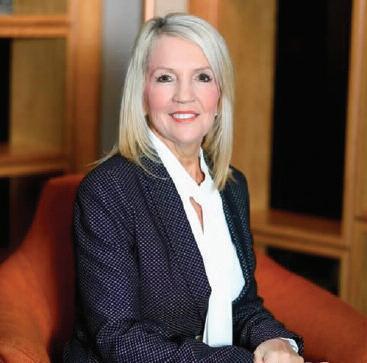
Thank you all for being here Alyson, can you tell us about the need, demand and market readiness for data driven social care and digital transformation?
ALYSON SCURFIELD, TSA CEO:
First I d like to thank Vayyar Care for bringing us together for this important discussion I’m delighted to be here
As part of the advisory body for technology enabled care in the UK I’m passionate about the power of data to transform care, enhance lives and deliver better outcomes for people and communities Using data to provide better care is at the heart of what we do at TSA We’ve been talking about this since early 2019 pre COVID and identified three cornerstones data people, and partnerships as the key drivers of transformation to enable true preventative care We ve had a bird s eye view of the process of change that’s impacting services and communities across the UK
We learned that we’re data rich but intelligence poor We need to give people relevant data insights that they can use to make more informed decisions and carry out better care planning not only for family members and frontline workers, but also to allow care recipients themselves to play an active role in managing their own self care Technology is delivering better outcomes for people It’s the glue of transformation and we’re starting to prove it
Data can drive better outcomes, enabling people to live longer inde pendently in the place of their choosing The scene is set for true health and social care reform
Let s talk about the journey from analogue to digital How are reac tive legacy solutions and devices falling short when it comes to falls management?
We recently conducted a survey of social care providers that identi fied falls management as the primary drain on resources 69% of respondents said that falls are the most common reason for responder visits But more than a quarter of those callouts turn out to be false alarms putting a huge strain on staff
A big part of the problem is that the vast majority of fall detection solutions on the market aren t practical Take cameras for example Most care users do not feel comfortable with video cameras invading their privacy at home
In the past caregivers had to deal with so many false alarms espe cially when it comes to fall detection Reactive legacy solutions like buttons and cords are useful only if they re within reach and the resi
dent is conscious mats are often unreliable and break frequently and wearables have to be charged, while the care user must remember to put them on
At Millbrook we ve recognised that historically the sector hasn t been using data as smartly as we could and that’s something we’re keen to address That s why we re partnering with companies like Vayyar and Anthropos, who share our vision, so that we can start lever aging data to get the best outcomes for our service users and help them feel secure about using the technology
We ve adopted a digital first approach meaning that we re phasing out all analogue devices Our goal is to start leveraging data to get the best outcomes for our service users
We want to capture the full benefits of technology to overcome the problem of false alarms and use it to predict and prevent crises
It s an exciting time right now and there s plenty of new tech coming on board We want to be sure that Millbrook is at the forefront of change and innovation in the sector
False alarms have made people weary and wary of technology that wastes valuable time and resources With all new technologies we need to give people confidence that they meet rigorous standards and have fully proven themselves
The transition from analogue to digital has been going on for the past seven years One of the good that the TSA and the industry s momentum have helped us to understand is that this isn’t just about replacing a device that signals analogue with a device that signals digi tal It s an opportunity for a step change to business models service models, and the outcomes you deliver because there is so much more power and capability in a digital environment We have more digitally connected customers than anyone out there and proven solutions to choose from We ve put digital infrastructure into more than 25 000 apartments and scores of case studies of people who were considering the journey and now have accessed proven innovative solutions
We ve gone out of our way to make ensure that we are as interoper able as possible We have transition models both commercial and technical to help the transition from analogue to digital We re not just moving from one box to another that would be missing the point The transition to digital can deliver services in a more effective person alised, and meaningful way for the end user, and that doesn’t mean at a higher cost You can deliver better services at a lower cost through more intelligent use of the digital capabilities that technology enabled care has to offer
Our survey also revealed that 90% of service providers acknowledge that frontline staff are spending too much time on administrative tasks More data should really mean less paperwork for staff What s more 88% of providers agree that more data about how long users spend at home and their activity would help deliver more personalised care And that leads to our next topic: outcomes How can we use data smartly to reduce the burden on overworked caregivers and ensure bet ter care?
It s worth contextualizing the word data It s not reams of information that need to be analysed It’s data delivered simply and sensibly Data is machine driven pieces of insight that can be easily shared in a digital form
We must be able to deliver single nuggets of information that care providers can act on
Simple messages like “I m OK”, clearly delivered on a dashboard, can make an enormous difference to the productivity of frontline staff
It’s the job of the connected care platforms like Anthropos and oth ers to process manage and analyse the data Ultimately care providers are only interested in the intelligence that will allow them to make better informed care decisions
They re only interested in the end product the insights That’s our job and we do it best when we know the desired care outcomes Then we know what insights we need to identify We take the data and divide it into four basic categories: environment daily routine and behaviour patterns physiological wellbeing and safety and security Then we take all that data and turn it into intelligence But we can only do that when we know what the goals are what insights we need to provide and what actions are required When you have a platform can reveal behavioural changes you can step in and take preventative
action Then you can make a real difference to someone s life no mat ter stage of the care journey they’re at
STUART:
You touched there on the importance of the joined up care journey Ultimately, it s collaboration that enables the delivery of person cen tred predictive care According to our survey almost 80% of service providers agreed that sharing behavioural data is critical to unlocking personalised outcomes We need to change the norm so that we can start working together cohesively as suppliers to support service providers in collaboration with TSA But let’s get more specific
What insights have been unlocked by the behavioural data you gath er and how do you share them with key stakeholders?
PAUL:
We re good at integration and that s because we understand the importance of working together I’ll give you an example We got an alert that showed that a resident hadn t started her morning routine within half hour of her regular pattern, and then the data revealed she had been up several times to go to the bathroom This is a person with long history of UTIs so the platform could identify this wasn’t the norm for her and sent an alert It s then up to the care provider to decide if it’s necessary to take action or just to keep an eye on them
STUART:
You re absolutely right Data sharing is the key to cohesive meaning ful and fruitful partnerships between technology suppliers platform providers and frontline caregivers Sharing behavioural data that reveals mobility physical and mental health and potential medical conditions is critical to unlocking personalised care and optimising out comes That applies both to overall care management and to the risk factors of falls
Exactly and that s why our customers want Vayyar Care Managing falls more effectively through better communication is at the top of our priority list when it comes to care management
Passive falls monitoring is so important because we all understand the drawbacks of wearables
We want to give people confidence that they re buying into a system that’s gone through exhaustive evaluation and testing, because if you re going to make a care decision based on data you need com plete confidence in the quality of that intelligence
ALYSON:
Achieving the best results through focused insights and intelligent data sharing is all about partnering with the right people Collaboration is paramount in terms of providing better outcomes We want to help people feel secure about using technology as a reliable resource and that s a team effort We re partnering with leading tech and platform providers like Vayyar Care and Anthropos who share our vision and want start to using smart tech much more wisely We need to guaran tee that our partners deliver the best quality adhere to the highest safety standards and like us, are committed to putting the service user at the heart of everything they do Above all we re committed to the quality standards framework which includes ethics and continuous quality of care
Come visit the TSA website We ll put you in touch with organisations that have loads of case studies to show how we’re making this possi ble We also have a list of certified members that we can guarantee are delivering this partnership approach and are delivering quality service
Well that brings us to the end of our roundtable on how data is transforming social care I d like to thank you all for being here and sharing your insights and experience As the social care sector expands, it’s clear that local authorities across the UK need to embrace new sensor technologies leading edge platforms and above all fresh best practices if they’re going to continue to put people at the heart of care
If you d like to discuss any of the issues raised in this roundtable or connect with any of the contributors please email Stuart Barclay directly:
stuart barclay@vayyar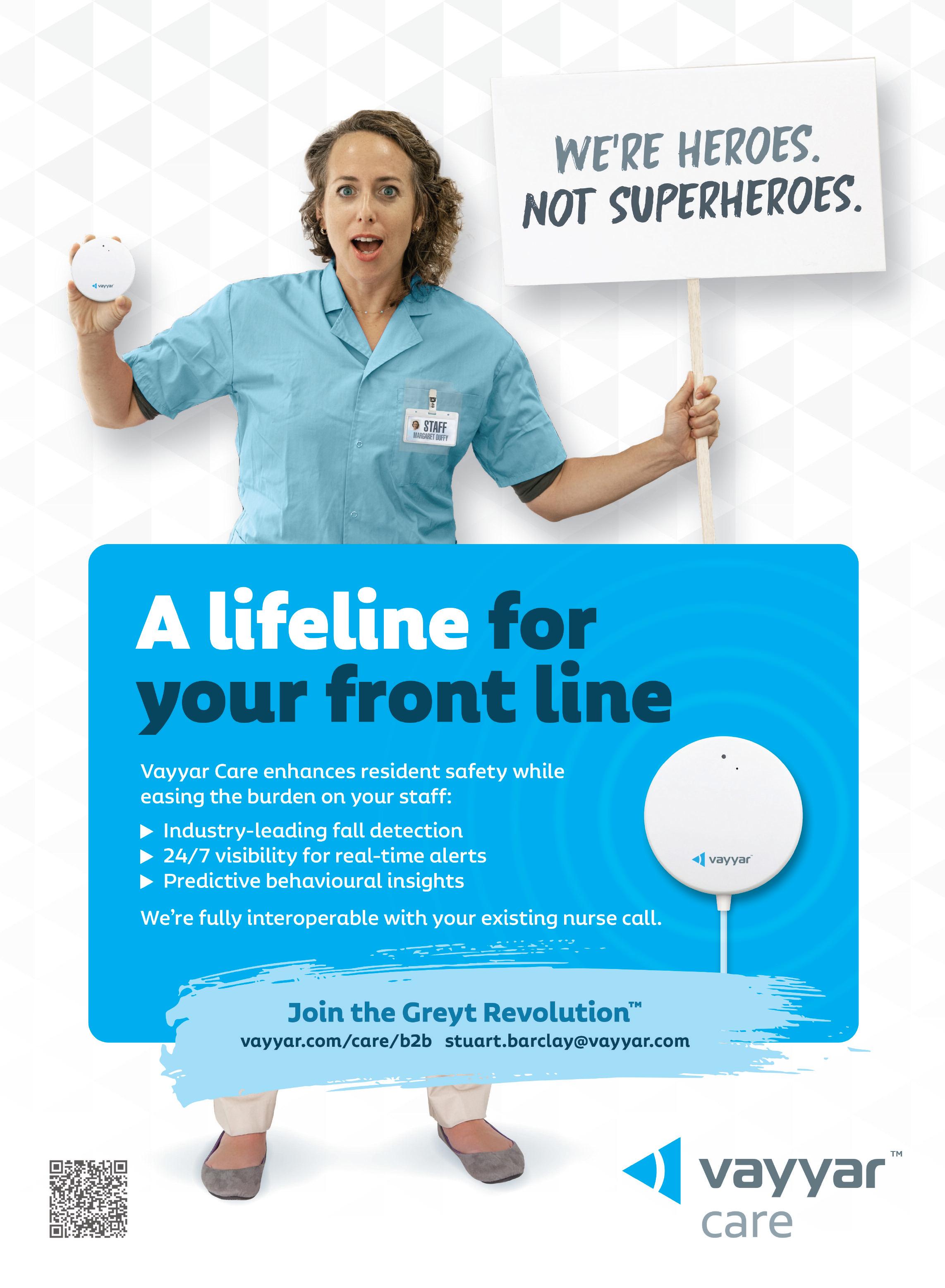
TIME
More time to care
Carers never have enough time to care but going digital can provide more
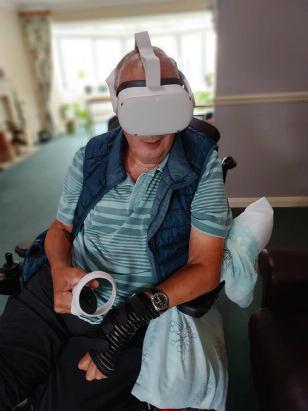
There are so many time consuming tasks such as writing care notes completing paper assessments fill ing in charts preparing handovers and countless other administrative tasks
Going digital can automate many of these tasks and enable recording care interactions in real time ensur ing nothing is left undocumented and saving time that can be better spent providing care
Digital care systems are safe and accessible main taining the security and confidentiality of your data
This is difficult to achieve with paper because sensitive information must be locked away when not in use per GDPR
Furthermore digital allows you to determine who can access and what via permission controls Staff only see what they need to see based on their role
Protect your business
Going digital makes it easy and efficient to evidence
the quality of care you provide In addition as a digital system has a complete audit trail you can be assured the information you are providing is accurate and com plete
COSTS
Costs and environment
The most considerable cost saving that going digital can provide is time While the amount of time saved will vary between service types and roles this alone makes going digital worthwhile
RISK
Using inbuilt alerts ensures that nothing is missed whether that s a care plan change or a fall report Using an eMAR will help reduce medication errors and ensure that the 6 Rs are always met
Going digital also allows the collection of data at the point of care which can be analysed to identify trends and risks and demonstrate corrective action
Improve staf f retention
Using electronic care systems to change the focus from the administration to the delivery of care helps
stage engage more with service users
Additionally providing smart tools like care planning and eMAR software to reduce the administrative bur den will decrease staff stress
Improved quality of care
With pre built assessments covering all aspects of health you can get to know your service users inti mately
But it s not just health; other characteristics such as emotion likes/dislikes and how they correspond to a wide range of activities can be recorded
Demonstrate quality of care deliver y
While the delivery of person centred care is para mount care providers must also provide evidence of the care they deliver and regulatory bodies actively encourage the use of technology
Digital care plans are the best way to achieve this!

VISIBILITY
Improved visibility
Electronic care systems ensure that managers have real time access to notes and information to instantly understand the care provided and help identify
changes that need to be made to improve the quality of care

AutumnCare con tains a customis able Dashboard to provide Managers with a snapshot of what is occurring across the care service at any point in time
WONDERING HOW TO GO DIGITAL?
AutumnCare provides specialist digital care planning and eMAR software enabling providers to migrate to a digital system and providing the foundations for out standing care We can walk you through what is required step by step as well as provide training and support every step of the way
To realise all of the benefits above plus many more get in touch with us today
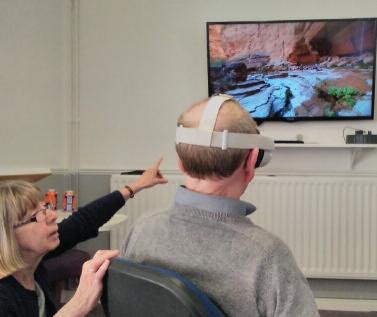
Contact Chris Sharman
Email c sharman@autumn care Call 0800 009 2121 Website uk autumn care
desire
Reminiscence therapy is proving to be particularly effective for people living with dementia and this is a fantastic example of how we can utilise modern technology to help them to unlock treasured memories and engage with others ” he further explains Advinia is one of the UK s largest care providers and has for some time now been engaging in groundbreaking technological advancements to provide the best care for residents With a vision to create a better every day life for its residents Advinia continues to explore the ever present opportunities that technology provides to make life for the elderly more enjoyable
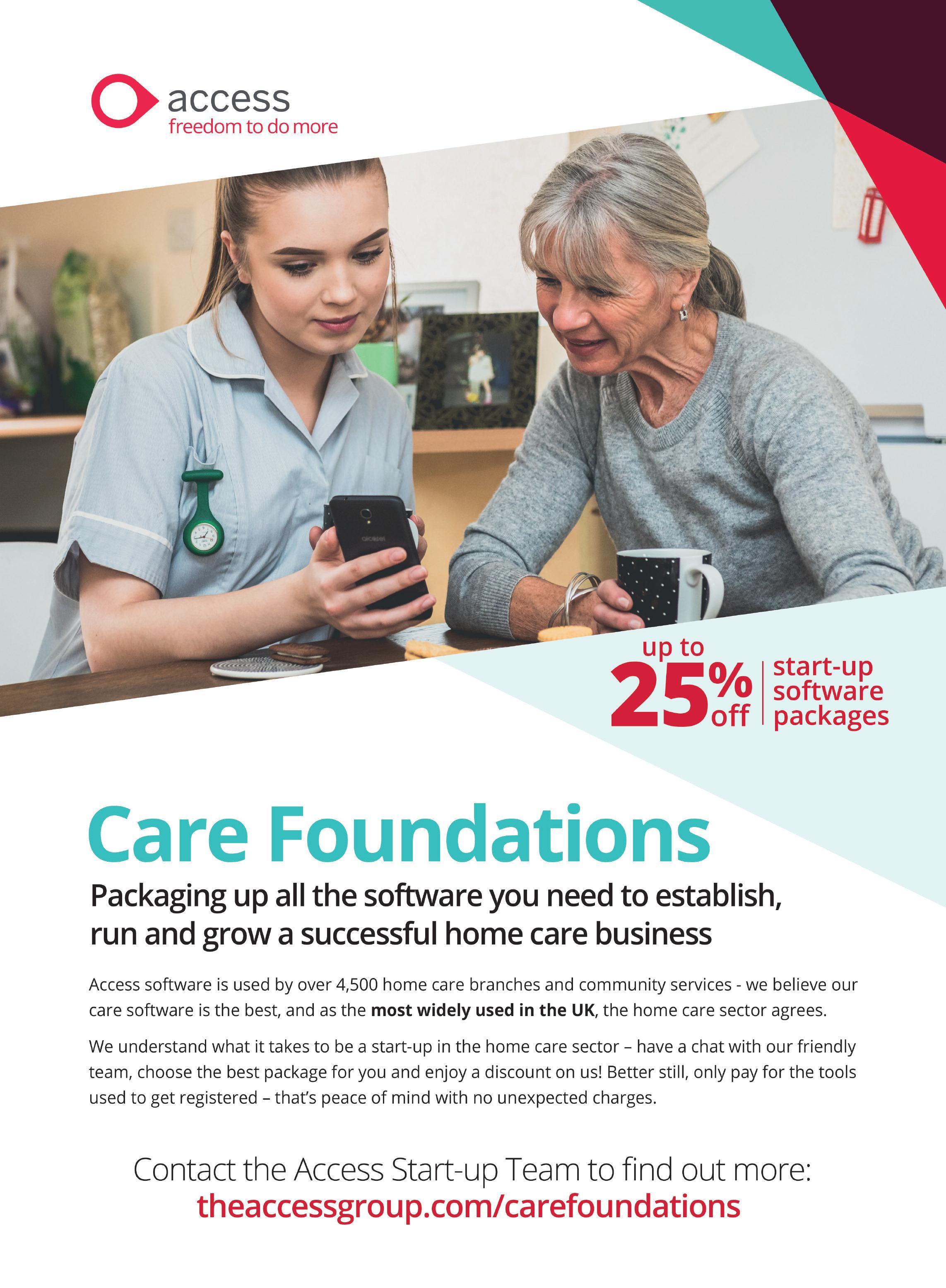
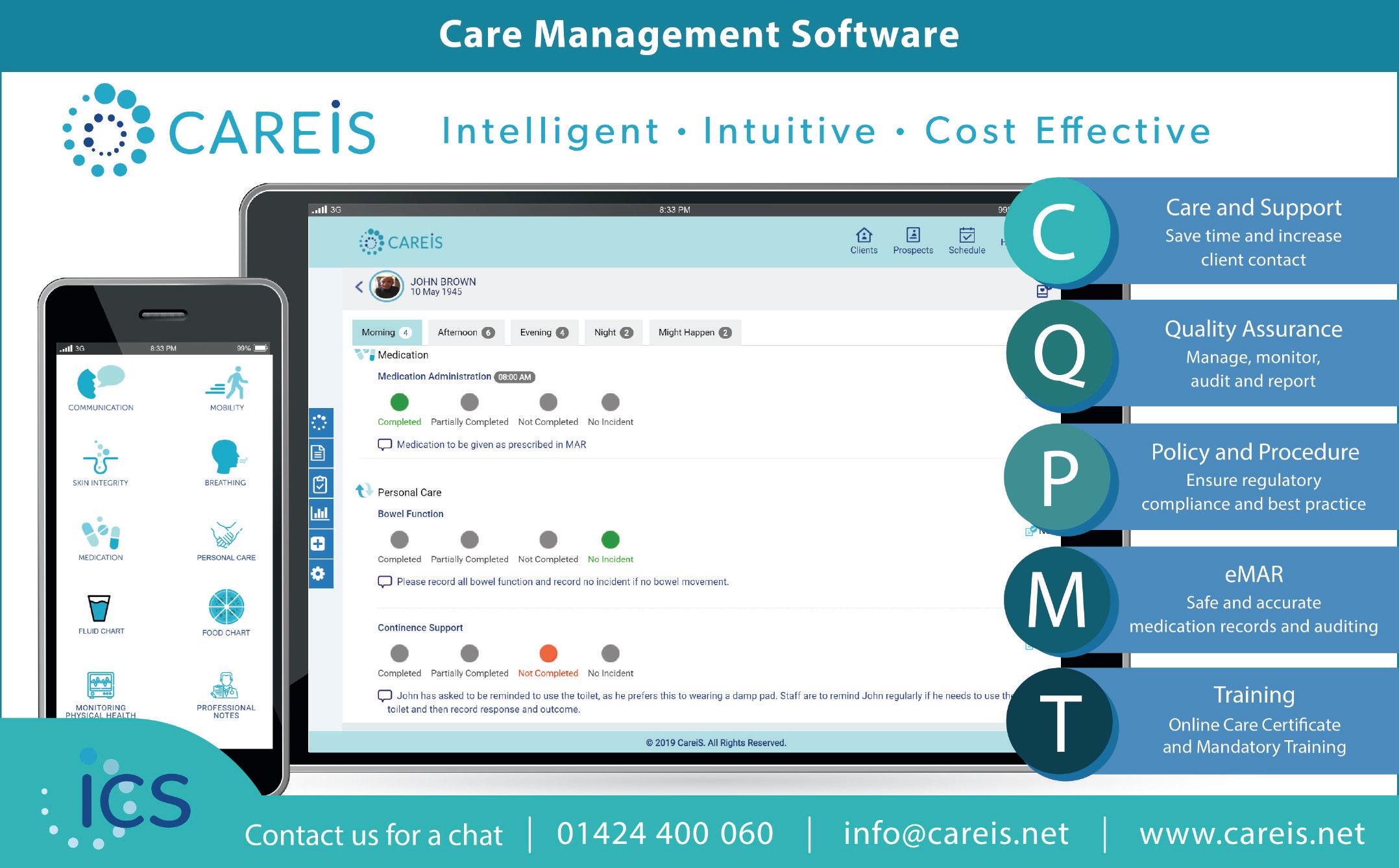
administration driven by ever increasing legislative compliance requirements and controls and pres surised by ever increasing costs The CAREAudits apps evolved from their desire to give something back to the Care Sector; to develop systems that genuinely reduce costs and increase efficiency as well as improving accountability and quality And above all a system that would be easy to install and use by every one
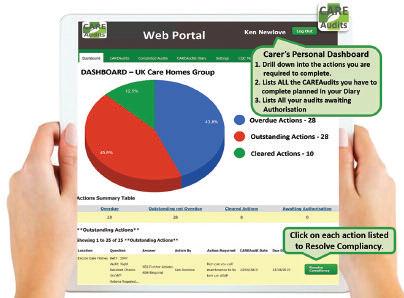

The CAREAudits app and Web Portal
now being
are thousands of
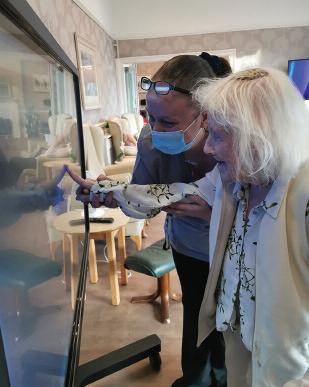
says “We were able to imple ment the system ourselves and are now benefitting from management having all the information we need at our fingertips in real time wherev er we are
The system allows care providers to audit or check just about everything and manage areas requiring actions (or non compliances) in it s Web Portal Encrypted date and time stamped evidence including photos is seamlessly auto attached and recorded in the system

Working in the Care Sector the team recognised in 2014 the sector was becoming overwhelmed with
Tool
everything from CQC Compliance and Safety to Medication Audits Training and Maintenance as well as service users quality and wellbeing and now Corona Virus Steve Smith regional manager at Care Homes UK
Natalie Lawrence at Yorkare Homes says It s a paperless system that runs alongside our existing client records system helping to make our whole operation paperless ” CAREAudits ensures manage ment and staff are aware at all times of what needs checking that it’s been checked actions required by whom by when including full resolution management Each CAREAudit also scores the answers so manage
ment can monitor improvement Steven Tegart from Talbot Group likes reporting and says “I wish all my other systems were as easy to extract data for management reports as the CAREAudits Excel links
The system has over 120 exam ple audits to select from CAREAudits apps are extremely easy to use and care providers can easily add or edit their own audits in minutes ensuring simple management of ever changing requirements App auditors can use CAREAudits with virtually no training it s that simple The Care Auditor s Hands Free Operation guides the user through each audit each question and answer with it’s own help text standard answers and standard actions required ensuring that the least skilled operative becomes the care provider’s expert Users can download the app for a free trial and be up and running with the full system in minutes
Please mention THE CARER when responding to advertising. Please mention THE CARER when responding to advertising.
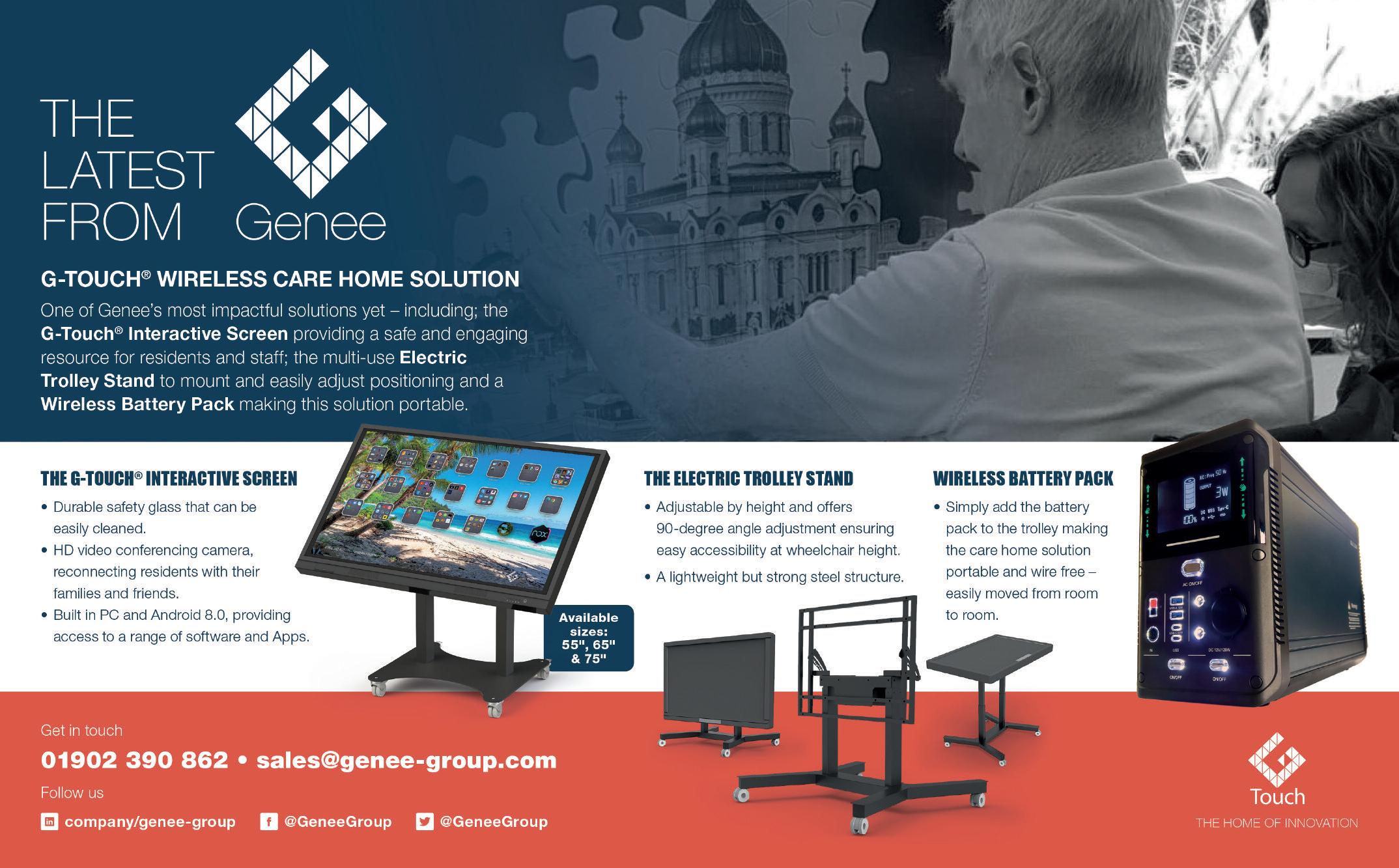
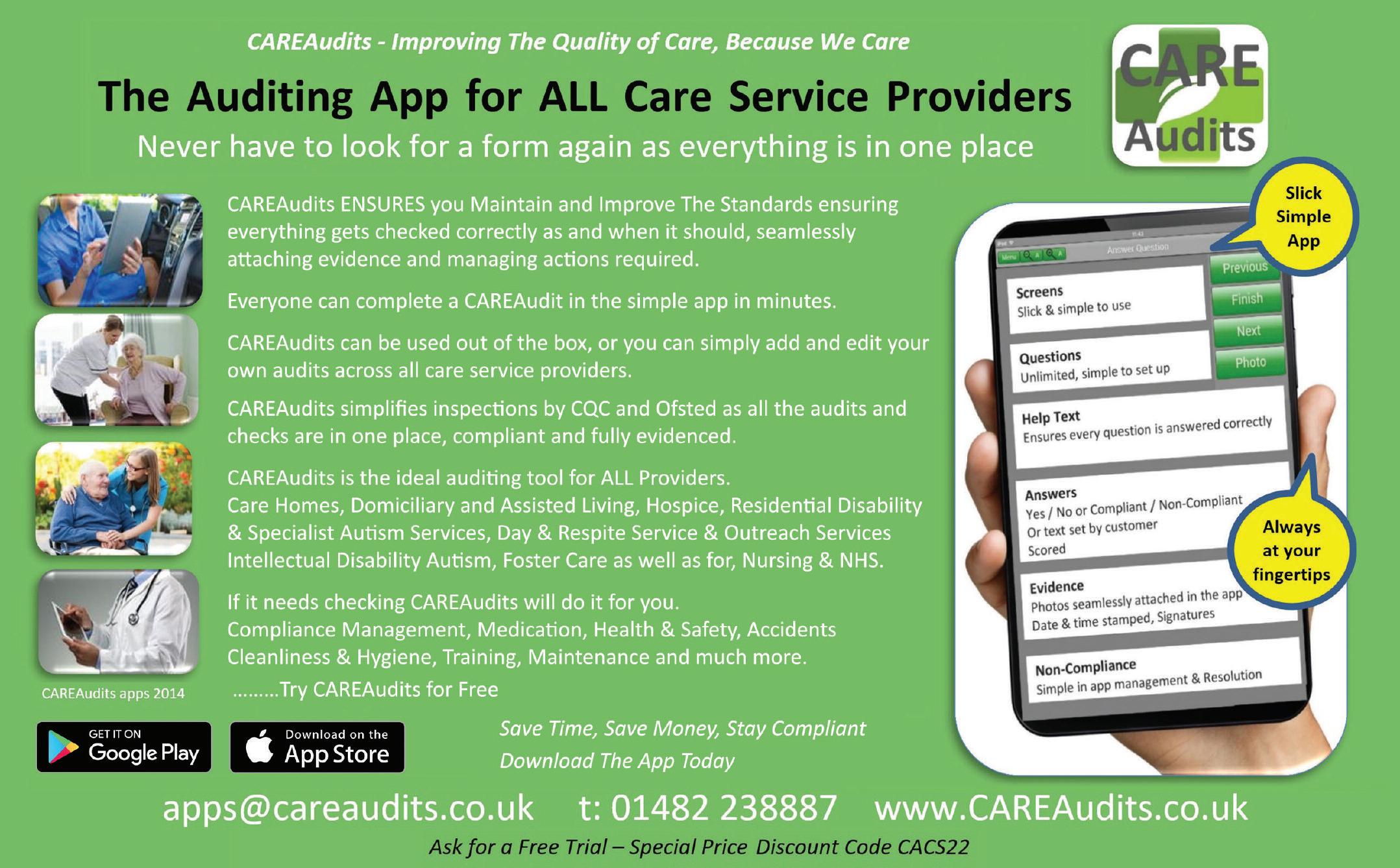
Specialist business property adviser Christie & Co has today launched its first Care Market Review 2022 report which analyses the transactional healthcare market in the UK: looking at buyer appetite transactional activity and investor demand local authority fee increas es and the funding landscape It also includes an operator survey which gives an insider view on occupancy and agency staff usage from some of healthcare’s leading operators
Christie & Co reports strong demand for care home opportunities throughout the UK with a 78 per cent increase in completions from 2020 to 2022 and deal numbers significantly ahead of pre pandemic levels This year offers sat at an average of 101 per cent of asking price underlining that strong investor appetite with competitive bidding is commonplace Christie & Co noted however that with the changing macro economic landscape the trend moving forward will be driven by a number of factors including the availability of capital and the alignment of vendors pricing expectations relative to prevailing market conditions

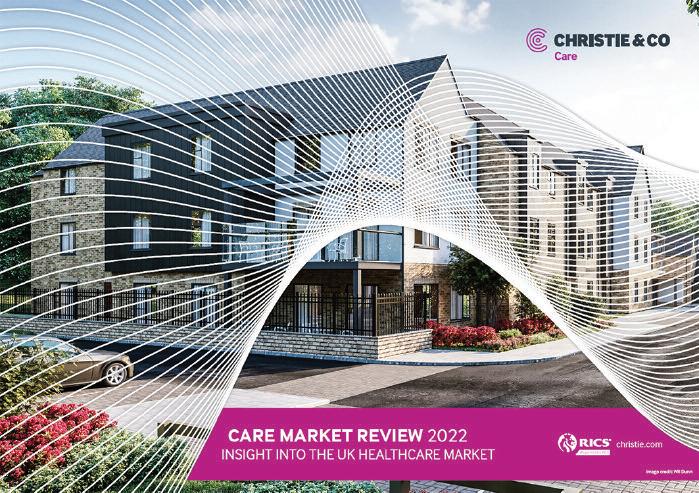
New instruction levels increased by around 30 per cent from 2020 to 2021 and they continue to grow as operators capitalise on the buoyant market conditions and strong values achieved
The company notes that its most active buyer type over the past five years has been independent operators with one or two homes which, on average transacted on 41 per cent of deals in the sector So far in 2022, corporate operators and investors have made up 33 per cent of deals while first time buyers made up just 7 per cent a fall of 9 per cent since 2018 which is reflective of the increasing funding challenges for first time buyers the regulatory burden of the CQC and the increase in quality, higher value stock on the market
Thanks to a competitive marketplace and the increased use of tech nology in care homes which can allow for some operational work to be conducted remotely buyers are increasingly looking further afield with almost half (48 per cent) of deals in 2022 concluded to buyers who live over 100 miles from their target business A large number of deals were concluded in and around urban centres yet there has been an increase in the number of care homes transacting in rural and coastal areas
HOMESOver 1 500 care homes ceased trading between 2015 and 2020 This was not solely linked to CQC ratings, as over 40 per cent of care home closures in 2020 had ‘Good’ ratings and were closed for a range of rea sons, including margins and cost pressures
A record 31 per cent of the care homes Christie & Co sold in 2021 were on a closed basis 56 per cent of these were sold for ongoing healthcare use whilst 26 per cent were sold for residential conversion The number of closed care homes sold dropped to just 13 per cent in 2022 however an increasing proportion (80 per cent) of these closed homes were sold to care home providers
When analysing local authority fee rate rises across the UK in the fis cal year 2022/23 Christie & Co found that fee increases fall short of inflationary cost pressures in the sector There was a large disparity between fee increases throughout the UK from 3 1 per cent to 12 8 per cent with an average residential fee increase in England of 5 4 per cent and nursing fees rising by 6 8 per cent Going forward the com pany expects the burden on the self funded client base to increase
OPERATOR
Christie & Co interviewed a cross section of local and regional

With resourcing placing a huge strain on care home operators 52 per cent of respondents said that they have a widespread use of agency staff Those that have obtained a sponsorship licence to recruit staff from abroad have been able to tap into new markets for their recruitment needs and this has been successful for many However with over half of providers still having to use agency staff to fill their rotas business costs are increasing further
While 43 per cent of operators said occupancy has returned to pre pandemic levels for 57 per cent occupancy is still recovering There is a wide variation in occupancy trends across the UK with many smaller regional operators saying that their homes are largely back to pre pan demic levels and larger providers generally reporting lower overall average occupancy rates Positively though the majority report good enquiry levels which suggests that occupancy rates will continue to re build during 2023
The report concludes with a look at the funding landscape written by commercial finance specialist Christie Finance which has seen 8 33 per cent fewer funded deals in the sector this year as operators look to their portfolios to expand or restructure existing debt The average loan size increased by 5 8 per cent, which suggests that funding in the sec tor is evolving to provide more refinance to buy or expand
First time buyers making offers on care businesses fell from 48 per cent in 2021 to 45 per cent in 2022 due to the perceived difficulties in raising finance This area of the market has been more challenging as the recognised lenders retrench to service existing operators with proven track records
Rob Kinsman Regional Director Care at Christie & Co comments “The last couple of years have presented the sector with huge opera tional challenges but it is heartening to see that investor appetite has fully recovered We have confidence that the entrepreneurial nature of the sector will ensure the transactional market continues to thrive despite the growing economic headwinds ”
To read the full report visit www christie com/news resources/publications/care market review 2022/
CLOSED CARE providers in the UK to gain insight into some of the operational chal lenges they re
Imagine a situation where you would have little or no worries about staff walking away and having a team that are very committed to your organisation
HOW IS THAT POSSIBLE?
By hiring overseas staff through the Sponsorship Licences Government Initiative (We can help you if you don’t have a Sponsorship Licence yet)
WHY WOULD THE STAFF BE COMMITTED AND LOYAL?
According to the legal arrangement of their visa (right to work in the UK) all these overseas staff are obligated to stay at your organisation for 3 5 years otherwise they lose their immigration status and are liable for deportation to their country of origin
This makes them committed and legally bound to stay and work with you
Someone might say this sounds too good to be true What happens if the staff is not happy? The reality of the matter is that a very small
percentage will not work out but that is where we come in
Firstly we preselect the staff that we feel will blend into the culture of your organisation Secondly we will supply you with the tips that ensures a better settlement procedure for overseas staff Finally we are at hand through the continual coaching and mentoring program to identify ‘sticky areas’ and work with you on getting a mutually benefi cial solutions
Purer Health Care Agency has been specially designed to help reduce the high staff turnover and its associated cost and disruptions as well as help overseas candidates obtain a better economically enhanced life This way we serve a business, social and economic pur pose
We have conducted a robust background screening conducting Criminal Checks Identity Checks Work Reference Checks and Family History Checks Hence all our staff have been prequalified and have
The Eden model is built on what people say they want in a Home or a workplace which therefore attracts residents and team members alike
As an Eden Home builds its reputation upon the quality of life it offers to the people that reside there it follows that occupancy improves
As a programme that empowers staff and focuses on their well being, It follows that staff retention improves
With a positive culture, a motivated and dedicated workforce, It follows that positive innovation becomes more possible sustain able and continuous
When demand for services increase it follows that viability improves
As a cohesive cultural progression programme it follows that innovation modernisation and positivity increase
The model is efficient cost effective and the training is deliv ered by experienced practitioners in Care Homes Homes are very busy places and the programme is therefore run on line for 1 hour per week for 6 weeks and people can do
this at work or at home
The 6 weekly sessions are run online with a workbook with links for further optional reading or viewing and should not be a burden to busy Homes teams and managers
It is however effective You can try without obligat on It is designed to make business sense to providers
It is designed to enhance viability
It is designed to support recruitment and retention It is designed to motivate Care teams and is open to any individ ual to add their CV
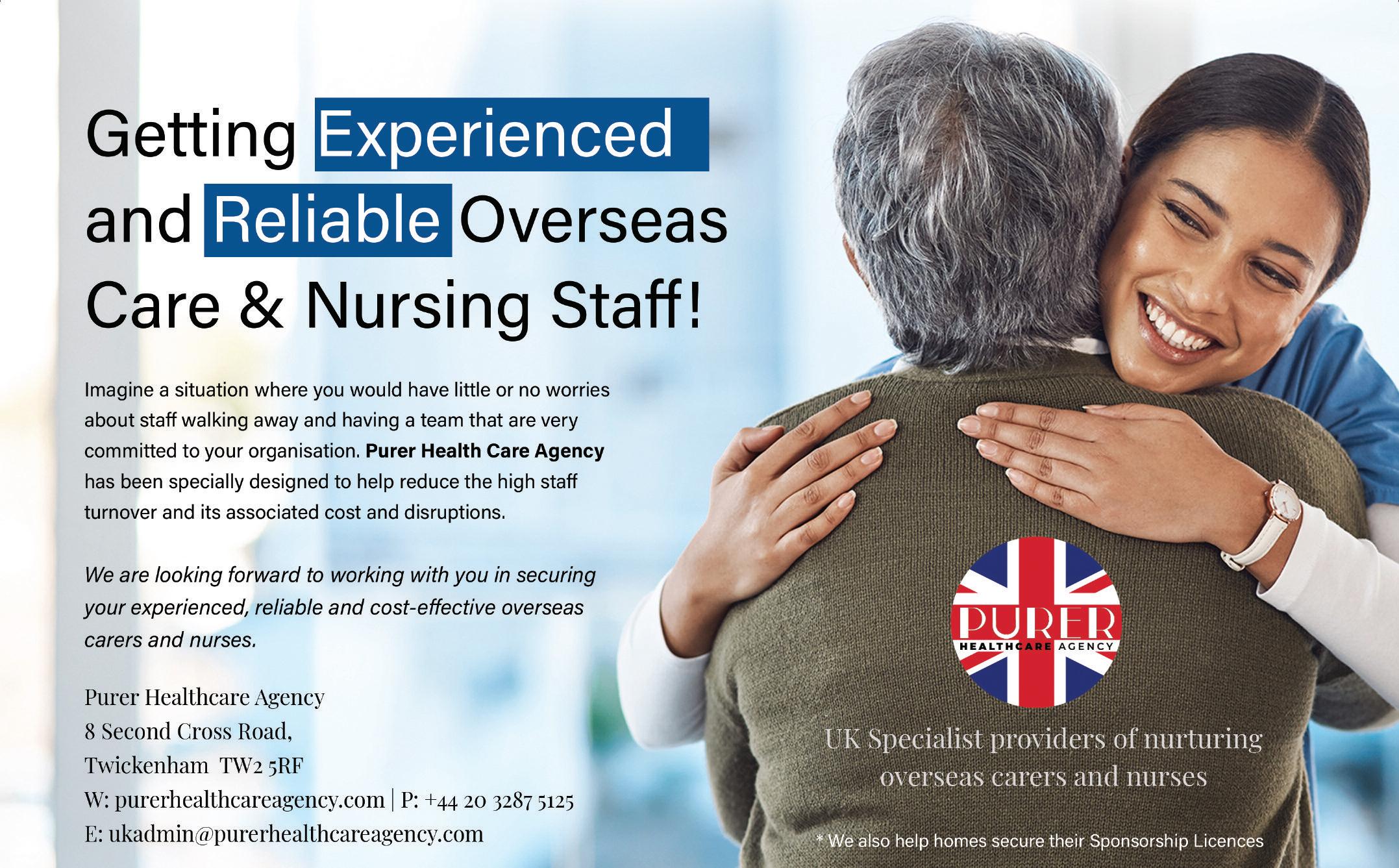
WHAT IS IT
It is a training programme which leads to accreditation and focuses in detail on 7 domains of wellbeing 10 principles and is particularly designed to address instances of loneliness helpless ness and boredom
Call today on 01626
